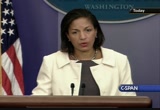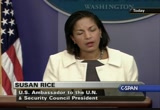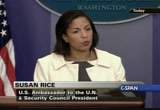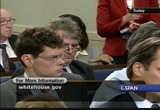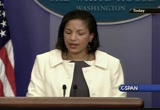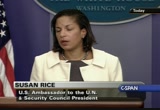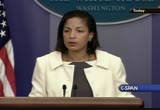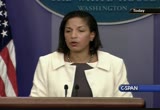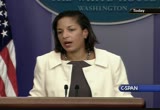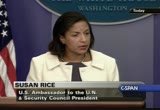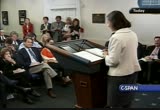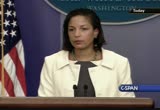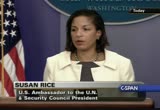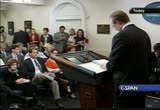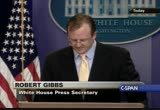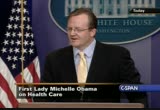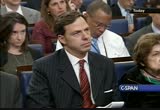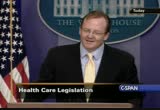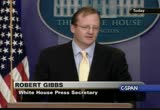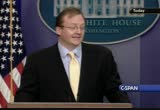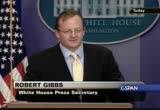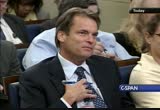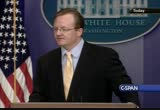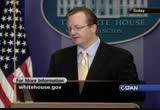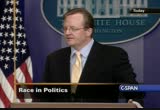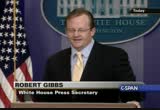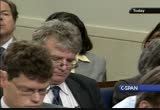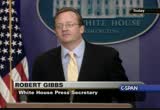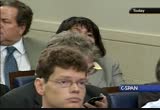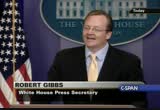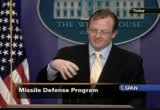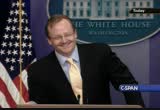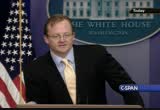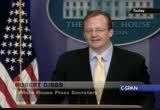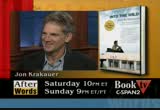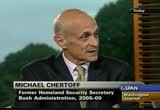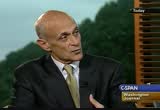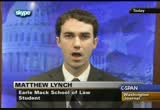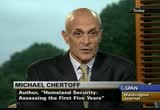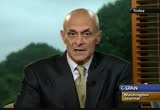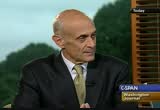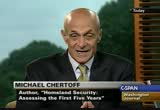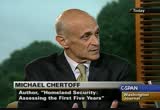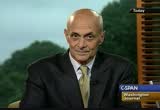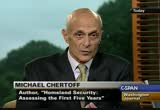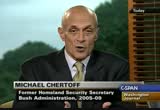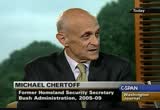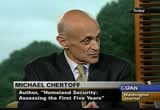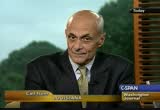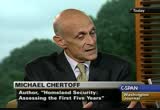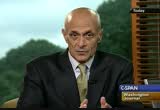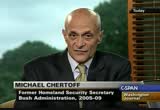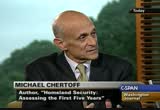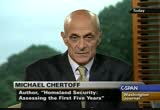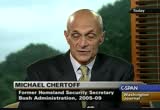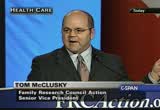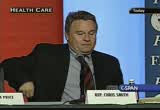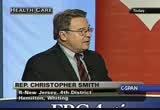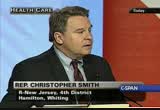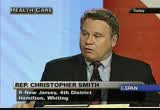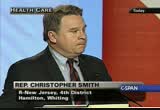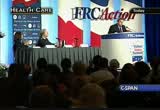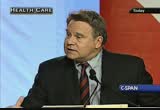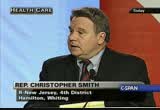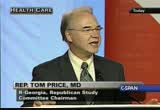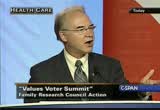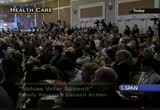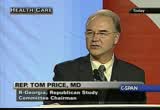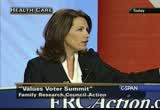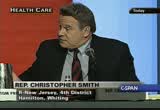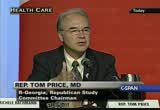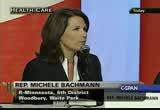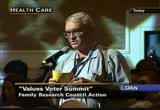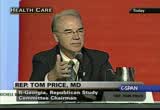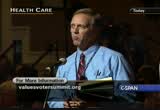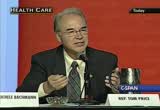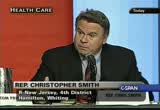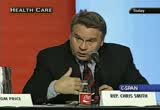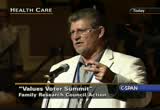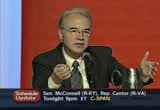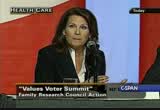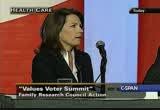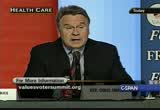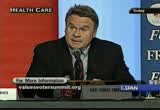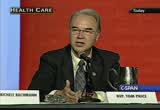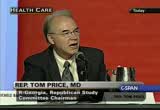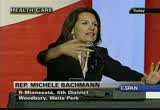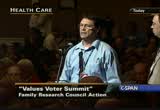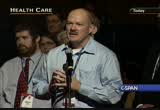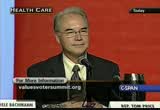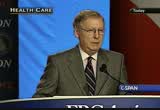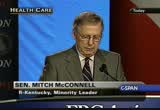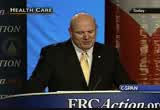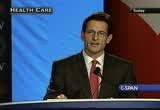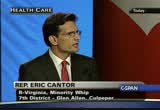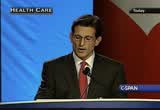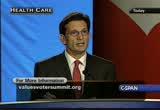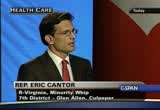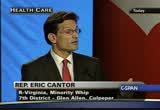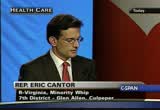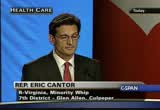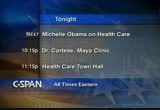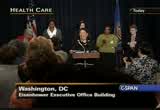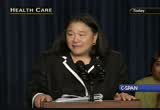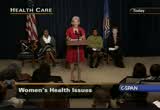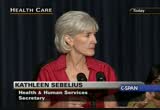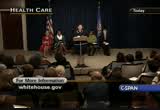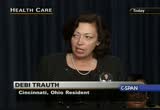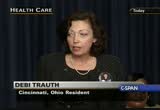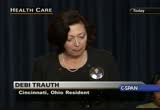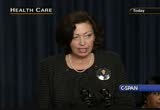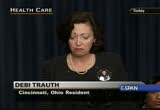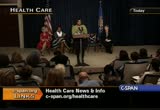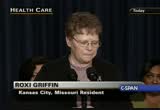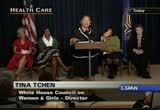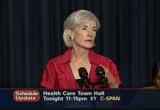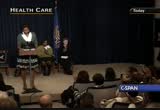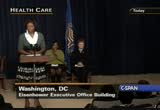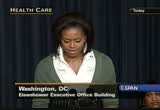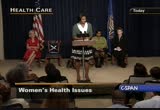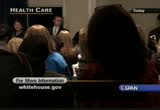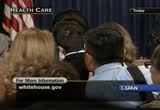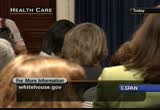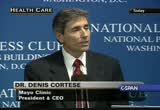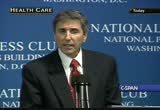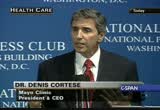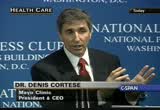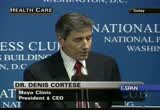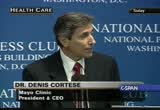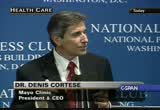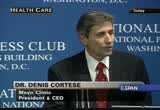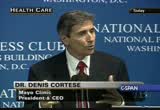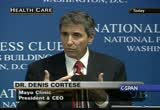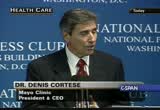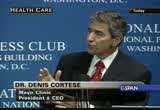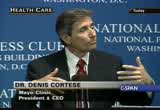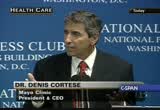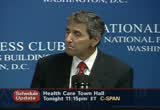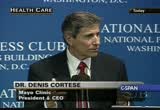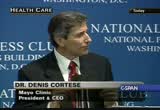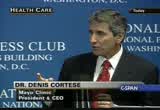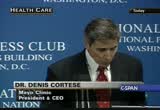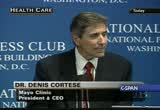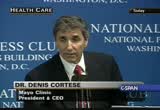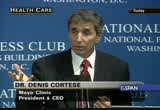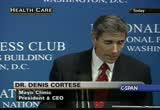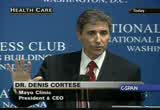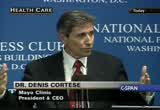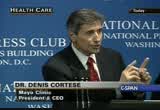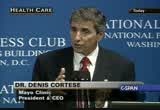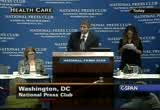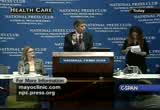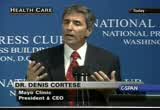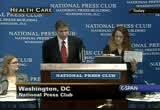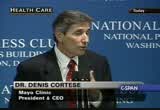tv Tonight From Washington CSPAN September 18, 2009 6:30pm-11:00pm EDT
quote
6:30 pm
6:31 pm
to more -- to have more of a say in global institutions such as the u.n., and will there be any movement next week or any steps taken next week towards that goal? >> china has a big stake and is playing a large already at united nations. it is a member of the permanent five. it acts in that room very much in an active way. china is one of the countries with which we work quite closely on the security council, but also a major player in the general assembly, where it is traditionally -- if has traditionally come to work with and sometimes on behalf of the non-aligned movement, what i referred to earlier, in that activity in the general assembly has often in the past broken- down in the form up bloc
6:32 pm
politics, non-aligned, western countries. these sorts of blocs and divisions are outdated. they often did not serve the national interests of the countries that participate. part of what we are beginning to see, and certainly what we think is essentials to tackle the challenges that i described at the outset, is for countries to move beyond those traditional reflexive bloc affiliations and look at ways to step up individually and collectively to meeting 21st century security threats. >> you do not expect any -- >> i am not quite sure you envision when you asked that. not in that context. >> will the president talk about that shield in either the
6:33 pm
sessions on thursday, and why does it appear that the president did not reach out and talk to either the czech republic or polish leaders until the night before he announced it here? >> which have been in regular consultations with our eyes in the czech republic and poland going back many months. this has been a dialogue that did not begin this week, and i think there has been a misperception about the extent of engagement and interaction on the subject. the president wanted to reach out in advance of any announcement and do so at his level, and did so. quite appropriately. whether this comes up during the course of next week, i think probably not likely to be a major theme next week. i cannot exclude that it will come up, but it is not directly germane to the main themes of the visit. >> and her beautiful smile.
6:34 pm
>> thank you. >> ambassador, on africa, something that you are very close to, what realistically can happen on this expansion of trade with africa in the next four years, and also, peacekeeping in africa, and also the issue of somalia. are those issues on the table as well? >> the lunch that the president will host with sub-saharan african heads of state and government is in my knowledge and experience unprecedented. it is an opportunity for him to engage with leaders from african countries on the issues that are frankly most pressing to them -- how to deal with the youth bold
6:35 pm
6:36 pm
were you asking? >> trent to build up their arsenals -- trying to build up their arsenals, as well as the leader been killed. is the president going to be talking to them about helping to gain a foothold of democracy in that country? >> our goal in somalia is to help support both the peace process, the new transitional federal government, the best look at somalia has had for quite some while, and the african you peacekeepers that are there very much on the front lines of supporting the nation's government. we want to see a somalia that a stable, or not able to serve as a safe haven for out data -- al
6:37 pm
qaeda, and the years of suffering and move to a responsible government that is able to assert its authority over all that territory. we're providing supports diplomatic to the transitional federal government, and secretary clinton met with the first time with the somalian president. where providing material support and humanitarian assistance and even develop assistance in somalia to try to consolidate the fragile progress. >> what is this government doing? >> there is a variety of efforts under way in support of the authorities in some marty -- in somalia to prevent and reached out some of those who are planning or plotting war and carry a gene in terrorist actions. >> regarding the nuclear nonproliferation resolution, what you expect it to say, and what country changes policies might come from out of there?
6:38 pm
>> the resolution focuses -- let me be careful and say it is not final. it is still being negotiated. it is close enough where i can give you some sense of where it is heading. it will focus on three broad areas. the united states and other efforts among the permanent five members of the security council, the nuclear powers, to move in a direction that is reinforcing of the goal the president articulated, a world without nuclear weapons for it there is a significant disarmament aspect of this. very importantly, without a country house is of it causes, means the focus that non- proliferation regime, and we hope that this effort of 15 countries to come together in support of some very important
6:39 pm
goals and plans will give the impetus to the 2010 non- proliferation review conference that will happen next year at the united nations. the third area relates to securing loose nuclear materials, a very important goal that the president has long articulated. it will look forward to the meeting that the president has convened next year here in washington in march on the subject. and so, in those three areas, i anticipate strengthen the north of as well as the substantive basis of action in those areas. the resolution -- you will have an opportunity to see it in the coming days when it is in its final form. i think that gives you -- probably by very early next week.
6:40 pm
>> what is the wish to have most often to do differently than their predecessors, and what is in your eyes the biggest achievement so far of the new operative approach? >> it is interesting. we did not hear a lot of which you would do this and that now. i am hearing a lot i'm glad you have done this and that now. i did not say that to be flip, but in all honesty, whether is joining the convention on the rights of persons with disabilities, whether it is working constructively, even in difficult circumstances, to try to find a rational outcome to the negotiations that were under way with a global financial crisis, or whether it is our successful efforts to negotiate
6:41 pm
the north korean sanctions regime. we are seeing the fruits of the new administration's change in policy and approach at the united nations. we are fortunate and i am fortunate to hear a lot of positive reinforcement in that regard. the most important accomplishment is what i just mentioned. it is the fact that we came together quickly and unanimously on two occasions to increase the pressure on north korea to abandon its nuclear program and its missile development and proliferation activities. >> climate change talks are essentially stalled. what is the president hoped to achieve with this address on tuesday, and what are the concrete outcomes that may result from that? >> the secretary general of the united nations viewed this summit as an opportunity to bring together all the countries
6:42 pm
of the world to try to galvanize progress in advance of copenhagen. clearly, the road is rough head, and i do not think anybody comes with any illusions trade is significant that you will have many heads of state, from the most vulnerable and fragile countries that are struggling to adapt to the effects of climate change, that need the technology and support to develop in spite of climate change, and you will have the most significant countries that contribute to climate change all together, and seriously addressing this problem, acknowledging its reality, not the ninth signs and fact, and talking about ways quite concrete lead that they can take nationally and collectively to address this challenge. the president will underscore the importance we attach and the seriousness with which we view
6:43 pm
the challenge of climate change, and he will underscore that this is very much a shared challenge, that everybody has to step up if we're going to succeed in making concrete progress. >> his commitment -- he has in some sense on the campaign, in front of the global audience, but the root of the question is, besides rhetoric, but from the united states and from other countries -- >> this is not a negotiation. this is a series of seminars and speeches and discussions in groups large and small. there will be an opportunity for heads of straight to drill down into particular challenges, mitigation, financing. in the broadest sense, as i tried to say at the outset, an effort to give political
6:44 pm
momentum and into this trade is not a negotiating stance. i cannot answer that one. >> ibthe iranians have made clear that the tabletop, they're not talking about suspended their prepared president ahmadinejad will be at the u. n. >> i do not expect they will have a direct engagement. i think he may find that there are many americans who are outraged by not only his comments of today, which were hateful and -- in again denying the holocaust, but also expressing serious condemnation of what has transpired in iran
6:45 pm
over the last several months in the wake of the elections. i would not be surprised if there were public gatherings that reinforced that message, and i think other governments that will be listening to ahmadinejad's speech will be listening carefully as to whether he reprise is the many -- many of the same things he has heard in the past or present a different to say. >> my question is whether you are expecting other governments to reinforce your message to him. >> yes. >> do you expect the delegation from united states to walk all out when he speaks, and if they come out to try to approach the president, how will the president handle that? and i do not want to guess what they will say, or what will be the appropriate response.
6:46 pm
with respect to the iranian leader, there is not much likelihood that there will be an interaction. there is no obvious venue in which that will occur, and we have no meetings or anything of the sort planned. and with respect to muammar qaddafi, libya holds a seat at president on the united nations security council, and libya will be president at the st. council summit. >> is that following through with what then senator obama pledged in his campaign, that he would have conversations and reach out with world leaders? why not have some type of formal or informal discussions with president ahmadinejad we have been very clear that there is an offer that was made by the group
6:47 pm
in april. there is now of late been a response to it, although quite a vague response, and the opportunity and then you for discussions will be october 1. >> i will let esotery -- i promoted. i will let the ambassador get back to work. i look forward to seeing many of you next week. >> press secretary robert gibbs gave his daily briefing. this lasts about a half an hour. >> on monday the president will deliver a speech on the economy in troy, new york, where he will be joined by dr. jill biden, the president will travel to the united nations in new york, on tuesday he will deliver remarks at the clinton global
6:48 pm
initiative, on thursday, following meetings at the u. n, the president will depart new york and route to pittsburgh, pennsylvania, to host the g-20 summit. in the evening he will host a working dinner with she-20 leaders, and friday there are a number of sessions, a lunch with g-20 leaders followed by a press conference at the end of that afternoon. in the evening the president will return to the white house and spend next weekend in washington, d.c. >> on tuesday, where? >> i did not have the times. my sense was that was in the afternoon, but i do not know that we have final times for some of those things. >i have not seen the draft yet. >> mrs. obama's speech did on
6:49 pm
health care, should we expect to see her case ramp up like the president has been on health care, or is this more of alone event? >> this is something that was on a topic that she and the present cared deeply about, an issue that she has worked on before, and i think she is obviously a very popular figure in america. if she can help out, we're happy to have her. >> are there plans to put her out front more pro? >> to the president here ahmadinejad's comments on the holocaust? >> i do not know if the president first they heard that. we have for that type of rhetoric before.
6:50 pm
obviously, we condemn what he said, and i would put to what the president said in cairo, denying the holocaust is a bigot -- these laws, ignorant, and hateful. for mrs. those lies serves only to isolate iran from the world. >> how should we interpret response about a possible meeting with -- on middle east peace? and i do not have anything dead. we have announcements to make, we will do that. >> reaction to the israeli official saying today that they would consider stalling building for nine months instead of six months, settlements in an effort to promote peace? >> obviously, something like that would be very helpful to the overall process, and continue the progress that i
6:51 pm
think former senator mitchell believes that we are seeing on this front. we hope to continue that momentum. >> the announcement yesterday was based on intelligence about erin's missile system, what they are building, what they are struggling with. how can you be confident, given the track record that that is accurate information? >> the president, the national security team have confidence in the information and assistance they were given without getting specific the current development where iran is focused and where they are having challenges. >> had there been major changes in the intelligence capably united states has for that
6:52 pm
region of the world? i do not think i need to point the failures that they have had in the past when it comes to iran, iraq, other countries in that area. what makes you think that this intelligence is correct? >> what is important is that a serious group of people have confidence in it. again, something i stated yesterday, we have the very same players in the secretary gates and general cartwright, the vice-chair of the joint chiefs of staff, who, based on intelligence and based on technological assessments determined in 2006 and a recommendation to then president bush, who have based on your intelligence assessments, upgraded technology and more tested technology made recommendations to president
6:53 pm
obama that he accepted. it is the same team, the same players that are making those judgments, and they have confidence -- without getting into detail -- in those assistance. >> any response to the baucus bill yesterday in college park, that the baucus bill was booed? >> not that i know of. we went over this this time yesterday, helen, and nothing has changed. >> that is not an answer that's clear. >> did not take my word for it, helen. can somebody go print me a copy of the president's speech and we will give a high lead a copy to helen. >> he has never push for that. he has not once. >> to follow up on jennifer's question on the first lady.
6:54 pm
she was really tying the push for reform to win in's quality, quality for women, and trying to give a whit -- get women involved. is as part of the strategy now, to get women involved? >> i think what the first lady highlighted was an aspect of health care reform that we believe is very important, the burden that it puts on those that are primary care givers for families, and what they have to go through, either with the skyron the costs of health care or in the event they do not have health care. look, i think this is an issue, dan, that touches men and women at every income double regardless of what you do for living. so this was simply addressing
6:55 pm
one aspect of that, knowing that everybody is struggling with high cost of medical care. they are watching skyrocketing premiums. their employer may be tracking their coverage. they may not have coverage. all that is important and health care reform. >> but it seemed like a personal touch to tell women -- >> this is the work family, it is a balance that something that the first lady has spent time a living, thinking about, and talking about as first lady. >> another question about the media blitz this weekend. on monday, when you look back at everything the president was able to do in terms of showing up on these shows, do you feel this is pegeen changer to advance the reform game? >> i have done this before. i am hesitant to look at every moment in every debate as a
6:56 pm
massive influx in point. >> it is important -- >> hold on. obviously, i have some say in what the president does for media. if i did not think it was important, i would have at least a good hour and a flat half chunk of time i would be within the present's schedule. we do not believe that is the case. i do not think we are going to look back at a series of interviews as a game-changing moment. it is important the president continue to speak to a host of different audiences to reach as many people as possible to talk about the benefits of health care reform. we have talked about this before, that people are getting their news from so many different places and so many different outlets, that we are going to use the president to
6:57 pm
communicate to the fragmentation. -- throughout that fragmentation. >> our people want to start to knee him out if he is out there this much? >> bill's line may have been the best this morning, sifting through your questions of more exposure in between your interview request invitations. >> just because we want and does not mean that people are necessarily listening. >> let me contemplate that for a minute. i think i can free up at least 15 minutes on the president's afternoon schedule. this is true in all the research that we see and in the research that you do. the american people understand the big challenges that our country has and they want to
6:58 pm
hear from the president of the united states about the choices that we have and the decision that we are making and the importance of each of everything that he is spending his time on. there is nothing that de notes that people are spending less time thinking about health care or watching the president. did that stop you? >> everything at the g-8 seemed to indicate that these meeting next week, we would know the direction of our relationship, negotiation, when it comes to iran. by the end of next week, will it be clear that there will be something tangible that everybody will be able to take away with, this iran thing is headed this way, that way? is it fair to say that next week is a fork in the road moment? >> the fork in the road moment
6:59 pm
will come with the iranians. there's a point where they will have to make a decision about the road in which they take on this. >let me finish my answer. obviously, this is a topic that comes up in our discussions, will not just our next week. it is on the present. you heard her mention a ministerial level meeting of the p5 plus 1, additional leaders the president will talk to struck the u.n. general assembly and the g-8. october 1 is an important meeting to determine how serious the iranians are at addressing the multitude of international questions about their illicit
7:00 pm
7:01 pm
>> i do not have anything to add to this other than what i said in the last couple of days. the president, his belief is that political disagreement, even passionate political disagreement, has happened throughout our history as a country. that is not likely to change anytime soon, and he does not think that it should. what he would tell you, i think, is that as we have that casual disagreement, as we talk about different avenues of policy that we can and should take, we had ought to be able to do that in a
7:02 pm
way that is civil in town and matter -- in tone and manner. >> it sounded like sea was sharing -- she was saying that leaders in the party sees tough and to denounce it. -- sees stuff -- see stuff and dencounce it. >> not just leaders. spokespeople, any participant in the debates should ensure that passion of political debate is done in a civil way and is about the important issues at hand. i do not think it is helpful for either side of the political debate to unnecessarily or offensively characterize an action or person or anything like that.
7:03 pm
i would say that to friends on the right and friends on the left. i think that is something that each member and each person involved is going to have to asked -- ask. >> why the uptick in traction? why is there more of a negative against this president in words and people than with other presidents? >> let me fall into a role that i have previously disabused of desiring to want to fall into. if i was somebody up your two years ago in a previous administration, they might say that passions ran quite high about the president then.
7:04 pm
i have certainly seen in reporting people and historians noting that passions have always been high, particularly around important issue debates. so i do not think that -- and i will reiterate what i said the other day, which was that we are in a culture and society that tends not to cover the middle of the road of this debate. it tends not to show on the evening news or the radio or in the newspaper those that quietly register their opinions. >> the issue of people privatizing social security. you do not hear people screaming. and also, in the impeachment trial of bill clinton, up passions did not run high.
7:05 pm
no one stood up and raised concerns. >> i combat passions ran high -- i think that passions ran high over our involvement in iraq. what, i didn't answer that truthfully, either? [laughter] >> [inaudible] i am talking about here. american citizens. >> again, i think i have exhausted the topic. mark? >> does president obama feel that he is catching more heat than any of his predecessors? >> no. >> does he worry that our position leads to violence? >> no. i think that what the president would say is that we all have to
7:06 pm
check our emotions, despite the depth of our beliefs. that we can have these kind of debates, important political debates, without doing so in a way that makes anybody feel uncomfortable or that could lead to what you are suggesting. i also believe that it takes away from what you are debating. i think that is also one of the things. >> would you ever say that race is a factor? would you ever? i'm not talking about now. i am talking about down the road. >> [inaudible] i am looking into my crystal ball and answering questions --
7:07 pm
>> he is not joe blow off the street. mainstream major leaders say this. you can not discounted. >> i do not discount it. i did not discount the views of former president carter, speaker pelosi, or anybody. we have had this discussion in my office, we have had in front of whoever might be watching. the answer is the same. >> robert, today's interviews and the health care rallies today and saturday -- does president believe -- does the president believed that mines are still out there to be changed on the health care issue? >> certainly amongst the american people, i think that those who watched the speech came away with a better understanding of what the president wanted to do.
7:08 pm
i think those that watched and talk about his health care reform plan have a better sense of how it impacts them, how it changes the costs that they pay, how it makes health care more affordable. in that way, i think it is beneficial. >> prime minister putin called the president's decision brave and correct. is putin miss reading the decision? was a concession? are there future concessions down the line? >> no. this was a decision -- again, do not take this from me. take this from a four-star general who was in charge of this in a previous administration and has purview in this one. what was announced is something that was going to be deployed faster, using tested
7:09 pm
technology, addressing the most current threat, and still providing flexibility to better address future threats. now, don't quote me or general cartwright. another general is saying that the president made the right decision. it flows not from any external event, but from technology upgrades. quite frankly, from testing. and based on our intelligence, the intelligence assessments said that instead of 325 long- range intercontinental ballistic missiles, the far greater likelihood who as a medium to intermediate-range -- was
7:10 pm
medium to intermediate-range missiles. you have seen the videos. they test these in multiple numbers at a time. so if you have that happen -- let's just say, if you have that happen and you have 10 ground- based interceptors, and somebody fires 10 rockets, what do you have to do? you have to be perfect, right? but to address a greater threat, we now have a mobile system, and as general corporate said to me yesterday, there are 120 holes that can react to multiple missile launches. >> does this harold some opening of trade with russia? >> we still have a vibrant missile defense system in europe. i think that is not the position
7:11 pm
the russians would like the americans to have. but i will tell you this. the president always believed that the criticism from russia was on founded, as he said. -- the criticism was unfounded, as he said. we will give you a sense of that later on the weekend. -- in the weekend. >> is there a health care component to that? >> i assume he will talk about it, but he is not focused on health care. >> in light of senate amendments banning federal funding for acorn -- >> i do not know if we have seen that. i think that the president shares the outrage of what he
7:12 pm
saw on the tapes, and i will leave it at that. >> on a question of overexposure, can you tell me a little bit about what he was expecting to talk about? anything beyond health care? will he make big news? >> i am not going to do that. i am going to hold my tongue. [laughter] no -- i do love this. at least half the questions the other day -- it is kind of funny. a couple of days ago, right in this room, right here, i got asked what the president was not more involved in a national conversation. and then the next question was, why is the president so overexposed?
7:13 pm
i thought we should have a short time-out, maybe a quick caucus, and we could pick one question. [laughter] i think that the president will talk about -- i will be surprised if he is not asked about afghanistan. i would be surprised if he did not get asked about missiles. i would be surprised if he did not get asked about the economy, the g-20, the united nations. what would surprise me? coming to a consensus about whether the president is to be more involved in certain issues or overexposed. let me take a few more questions. >> next week will be the four- month deadline he has set for
7:14 pm
closing guantanamo. four months out, i think, is january 22. [laughter] [inaudible] i do not know if you will be briefing next week. in any event, what -- is there any internal tie line for resolving this? isn't there a point at which outside experts are saying, you know, four months is not enough time to take a facility, get permission, set it up, fill it with guards and all of that? is there a time line? the day before he will announce it? >> in the event it is not done by the date he said it would happen, i will declare it undoable. the president believes and the
7:15 pm
team believes as they continue to meet about this that we still can meet the timetable that the president recently outlined in the executive order. we are continuing to work through a whole host of issues, many of which you mentioned, working on reform of military commissions, and seeking the swift and certain justice for those that are there. but i think we are on a time line that is doable, and the team will continue to work to make that progress. >> could i just follow up on that? i looked at the statement released yesterday and i'm still not clear on whether the white house is comfortable with senator inouye's language that are springing detainees from guantanamo into the united states -- that bars detainees
7:16 pm
from entering the u.s. at any time? >> is there any chance the u.s. would go into that meeting without agreements about negotiations? >> let me talk about them -- let me not talk about the meeting that we have not yet announced. >> is the white house urging a meeting next week? >> we're actively involved in trying to bring both sides together to continue to advance the progress. the progress that we think we're making on middle east peace. >> [inaudible] the discussion with the russian president? >> they have talked about it in the past, and i assume that that would consider -- continue now. >> [inaudible] two gubernatorial candidates whose elections are coming up?
7:17 pm
>> yes, obviously we have made stops for each. i soon as we get closer to election day, -- i assume that as we get closer to election day, we will do so as they extend invitations. thank you. [laughter] >> i am under appreciated. [laughter] >> this weekend, jon krakauer, bestselling author, on his latest, a biography of pap tillman, killed by friendly fire in afghanistan five years ago. c-sp [captioning performed by national captioning institute] [captions copyright national cable satellite corp. 2009] >> next month, get a rare visit inside the supreme court as we talk to justice is about the history of the court.
7:18 pm
>> brandeis would not come in here. the reason is because he said the building is so elaborate, it would go to their heads. and maybe he was right. it has become overtime a symbol of the third branch of government and the need for stability and rule of law, which is what americans stand for. >> as a complement to this production, c-span offers teachers free resources on our judicial system. go to c-spanclassroom.org. >> michael chertoff join us on this morning's "washington journal." this is about 40 minutes. >> michael chertoff, in your new book "homeland security: assessing the first five years" you write about the september 10 mindset. this is where you ride, "the voice of complacency sounds something like this. here we are eight years after 9/11, and because there are no
7:19 pm
attacks on our soil, 9/11 has got to be a freakish aberration that is not going to repeat itself. al qaeda a is a threat to the government and exaggerating the threat. there are other things to worry about and we should move to something else and focus on other elements of the public agenda." guest: i think that is a concern, and to be honest, it was a predictable concern even in the days after zakaria 11. i remember president bush warning this was going to be a long-term process. i think other people said we were terribly afraid of another attack, but if we were successful in preventing attacks, the irony is that it would likely communicating to assemble they are to lower their guard. for me, it is not to get people to the level of fear or anxiety right after 9/11, but also to make sure that we do not go back and repeat the mistakes that led
7:20 pm
to 9/11, which is not being -- not persevering in terms of building our defenses and in terms of making sure we are taking on the enemy and not adapting ourselves to what is an evolving strategy that we see the terrace engaging in. host: you do not write about this in the book, but do you see any signs in the obama administration that, in your view, they are returning to that? guest: the obama administration at this point seems to be continuing largely along the course that we set over the past eight years. certainly, in my department. i think secretary the paulick tunnel has been a very good leader and i think she has continued to press for on a you talk to our regularly paxman guest: not regularly -- do you talk to her regularly jackson a a guest: not regulate, but we are friends -- do you talk to our regularly? guest: guest: not regulate, but
7:21 pm
we are friends. prior to 9/11, the think board about most was the truck bombs. -- the thing people were most worried about was truck bombs and that was a reasonable concern. but of course, after 9/11, we sought airplanes become the weapon of choice. now we have seen, of course, the airport and airlines are targeted. we saw that most recently in august, 2006. still more recently in 2008, there was an attack in mumbai and for the first time we saw a different kind of a threat, a roving attack with guns or the terrorists move from place to place. the terrorists continue to refine what they do and what is important is that we continue to think ahead about what is not only happening -- what has not only happened before, but what might come next. host: when you talk about what some of the things that need to be done are, the first thing you stress is securing the border. why? guest: from the standpoint of
7:22 pm
moment security, if you cannot stop the enemy overseas, you want to stop them doing -- coming in. and you do that in two ways. you look at the courts and you have documents that you can check and you look at whether they should be admitted or not. the second half of the strategy is between the borders. and there, we've built over 600 miles of fence, began to lay down some sophisticated technology. in both of these areas we have made substantial progress, but the job is not done and it has got to continue. that is the current agenda. host: our guest is michael chertoff, served from 2005 through 2009 as secretary of homeland security. the numbers are up on the screen. we want to hear from you. also, we're going to hear from some law students up at dressed -- drexel university in philadelphia. they turned -- they attend the
7:23 pm
earl mack school of law up there and the c-span bus is parked there. we will talk to some of those students, too, let questions for michael chertoff. matthew is the first student. please go ahead with your question for secretary chertoff. >> given the recent disclosures to which -- to the extent to which the federer has lied about things like blackwater, johnson that were traditionally the role of the government, whether they be interrogations' or assassinations, the you think the supreme court doctrine of either integument [unintelligible] host: matthew, i'm sorry, we lost your audio. you were talking about the contractors. could they be effectively considered what? caller: state actors.
7:24 pm
host: ok, thank you. guest: this has a lot of different dimensions. when contractors aren't as the federal government, they often are considered state actors and they are held to the same standards. clearly, there are a number of areas in which contractors make a lot of sense -- logistics' cause of why, even security were they could supplement a military -- logistics, supply, even security where they could supplement a military that is already stretched thin. in the end, the government has to reserve the ultimate decision. the contractors, however, can help the government in formulating that decision and carrying it out. host: first call-up for michael chertoff, st. petersburg, fla., william, independent line. caller: good morning, gentlemen. guest: good morning. caller: you mentioned the
7:25 pm
september 10, 2009 mind-set. that made me nervous. [unintelligible] the $2 trillion plus missing reported by donald rumsfeld. where did that go? did you ever find it? guest: i must have missed the news report about the missing trillions. i do know that in the run-up to september 11, theç 9/11 commission and took a look back at what had been done and what had not been done. i think they found the key problem was correcting information and using information -- correcting information and using information to get the best possible picture. in the cold war, we worry about bombers and missiles attacking the united states and that is why we had radar. in a war involving terrorists, we do not have radar that is going to attack -- detect bombs
7:26 pm
and missiles, but what we have is intelligence, the ability to gather and analyze and integrate intelligence as the principal way in which we protect ourselves. host: your predecessor, tom ridge, wrote in his book, but then denied it, saying that the color-coded system, he raised it and it was a political -- he raised it and it was a political issue why he raised it. guest: actually, i do not think that tom ever went that far. he wondered why some are making a political calculation. i can tell you that unequivocally during my four years, there was never a with or hint of any political calculation or white house pressure with respect to the color code. we raised it twice, right after the july 2005 london bombing for about a month and we did that only with respect to mass transit, and that we did it after the august 2006 airline plot for obvious reasons. it has remained at an elevated
7:27 pm
level because we have continued to see efforts to attack our airline system. there is a reason we raised it. there are a series of operational steps that are taken either at the airports or subway stations that are tied to the level of the alert. we want to have a high degree of security in a particular place and we need to raise the alert level to do that. i read in the paper there is a recommendation to reduce the number of levels. i have advocated for that myself. it is unlikely we will be getting down to the most benign levels in the foreseeable future. but i think the voice vote -- the basic system is sound and has not been changed in the last few years and that reflects the fact that it has become a more stable and accepted process. host: as a private citizen now, what you think of your tsa? guest: i have had an opportunity to go through it frequently.
7:28 pm
i am impressed by the screeners. i have had the opportunity to talk to them face to face. they enjoy the challenge, but also in -- understand the importance of the job. and we have also reconfigured the with the system works to maximize the ability to move efficiently and not compromise on the level of security. the next big step is going to be a technological jump. even last year, i could see evidence that we were getting close to some positive developments. the better the technology, the more efficient it will continue to be. host: next call for secretary chertoff, new book out, gwenn, mich., mark, republican. please, go ahead. mark, you know the rules. you have got to turn the volume down on your tv. i'm going to put you on hold and we are quick to talk to a truxel law student in philadelphia. go ahead with your question for michael chertoff.
7:29 pm
caller: what you think is the biggest issue with: security that is currently not being addressed via [no audio] guest: the biggest issue not been fully addressed by the current administration. i do think they are continuing the initiative that we have with respect to the border, with respect to the transportation security. security. we had a measure with cyber security that president obama talked about as an area of focus. that was the right thing to do. i am a little concerned that we do not have much more progress. it raises civil liberties
7:30 pm
issues, and it is complex to talk about managing security over the internet. the alternative is to expose us to more and more threats, either from foreign countries or criminals or terrorists, and that will put our cyber-assets at risk. host: give us a specific risk. guest: there are several we see. most often you see someone stealing personal data or hijacking a financial system to commit a crime. recently, there was a huge hit on a number of retailers.
7:31 pm
during a conflict between russia and georgia, georgians have a cyber-attack that was parallel to the physical attack from the russian troops. so the issue of denial of service is crippling. it is a big problem. a third problem, least often reported, is espionage. curato. all of these areas demonstrate the kind of vulnerability is we have. we are working to reduce those vulnerabilities but this is going to take a process that is not only government, but the private sector as well and that is why we need to get this cyber security strategy reinvigorated and push forward. host: mark in going michigan, you've got your volume down i know and go ahead with your question. caller: mr. chertoff, i wanted to let you know that i called
7:32 pm
the department of homeland security and was trying to get them information. they connected me with the fbi and as soon as i mentioned the wealthy elite they cut me off. i called back to the department of homeland security and ask them, i am trying to get to the department of homeland security some very information -- very important information. they connected me back to the fbi. host: what is that important information? caller: it is called the wealthy elite. we have overwhelming evidence to prove that these people have taken control of the united states federal government. they are the ones that attacked as on 9/11. host: mr. chertoff, if that man has information to share, where would you recommend himal to send it? -- recommend him to send it to? guest: i think they did the right thing by sending in to the fbi. they have to evaluate whether there is actual evidence to proceed.
7:33 pm
but normally, the fbi is very responsive if there is a serious, credible piece of information. host: what is your general opinion of people who think that government was involved in 9/11? guest: i think that is grouped with a holocaust denial and the people who think that president, was not born in hawaii. it is conspiracy -- president obama was built not born in hawaii. it is conspiracy theory. -- president obama was not born in hawaii. host: next call from new jersey. caller: is it your opinion that most of the problem with immigration in the united states has to do with the people who overstayed their visas as opposed to people who are crossing the border? if that is true, why are more resources focus on border control as opposed to trying to get reform for a visa limits? my second question has to do
7:34 pm
with the whole thing with nafta. do we think that because we are in naphtha that we should have an agreement with our neighboring countries not just for services, but a free transfer of labor? guest: two great questions. first of all, the caller is right, when people focus on illegal entry between the ports of entry at the border, particularly the southern border, about 40% of the people here illegally came in that legally and overstayed their visas. it is true is important to focus on all end of the spectrum and the way we did that was that we not only put fencing and technology at the border itself, but we have better systems in place at the airport to try to judge whether people are really going to abide by the visa terms and go back home or stay illegally. another big piece of this is enforcing the law against
7:35 pm
employersç who basically make a business out of hiring illegal workers and that, of course, creates encouragement for them to stay. we have to deal with all elements of the problem. with respect to the second question, again, i think that nafta does a couple of things that impact immigration. by stimulating the economy, particularly in mexico, it creates more jobs in mexico, which reduces some of the pressure for illegal immigration. but i think the caller makes an interesting suggestion, which is, if we're going to talk about comprehensive immigration reform, which we tried to enact in 2007, we do need to talk to cut trees -- talk to countries like mexico and they need to cooperate with us. we need to make an arrangement with them that they will work with us so that only people who are approved by us come into our country as opposed to thinking across the border. host: in your book you right --
7:36 pm
here is a tweet that came in from lynette. guest: i appreciate the sentiment. i can tell you, though, as a matter of fact, that we significantly reversed the problem of the border during my tenure. for the first time in the last -- for the first time in the last couple of years, we saw a decrease of the border and a minimum of stabilizing across the country. we go over 600 miles of fence. we doubled the border patrol. we laid out the technology. would dramatically increase the number of criminal cases against employers. we get a lot to change the dynamic, but i will also make
7:37 pm
the point that it has taken years to get where we are. and it is going to take some years to finish the job of getting the border under control. host: nicole aidan is a student at the earl mack school of law at drexel university in philadelphia. go ahead with your question. caller: good morning, mr. tradeoff. that should the executive branch comply with international law in the use of force in conducting its war on terror including those laws and treaties to which the u.s. is a party or perhaps customary international law? guest: a very good question. the constitution says that treaties are the law of the land, therefore, when we enter into a treaty, we comply with the treaty as a matter of law. the -- the issue of customary international is a bit different. for people who are not lawyers, that is a doctrine in the international law that says that if you look at the way states gave and they seem to basically
7:38 pm
be eight as if there is a legal principle involved, -- behave as if there is a legal principle involved, then you can actually derived that there is a legal principle. whether we are bound by customary international law depends on the feeling of the role of congress in setting our own laws. to the extent we deferred to international laws we have not signed up to buy trudi, it undercuts congress' constitutional role to ratify treaties. some things are so well except that i think we would all agree that they are and -- a matter of international law. for example, the laws against slavery and genocide. but there are some that we would have to have a certain from of social work from -- welfare system or educational system. then i think we go as a constitutional matter, we owe it to our own citizens to make sure we are not getting ahead of our own lawmakers and what our constitution requires.
7:39 pm
host: where are you doing today? guest: going to go back to the office. host: no, i mean, what are you doing these days? guest: have an advisory -- i have an advisory system that i have set up with a number of former colleagues. host: 0 haden. -- michael haden. guest: michael haden as well as others. we call it the truck group. i divide my time between security advice -- we call it the chertoff group. i'd bet my team between -- my time between security advisor at other things. the do host: enjoy yourç time - did you enjoy your time as common security secretary? guest: it was a very good and
7:40 pm
challenging time. in a very personal way, i felt the impact of 9/11 and i lost friends on 9/11. to participate in helping to secure the country along with 218,000 fine men and women who serve the country, was a great privilege. were their frustrations? sure, was it hard work? 24/7, yes. to be honest with you, the real test at the end of the day was, no successful attacks on our watch and that is -- that has been a meaningful metric for me. host: chapter 14 -- guest: that is one of the great
7:41 pm
myths of the west for several years. i spent a lot of time as a common security secretary working with my counterparts, particularly in europe, and what surprised me initially, but also pleased me, was the close relationship of that relationship. people believe there is a wedge between the u.s. and europe and the rest of the world. there are small differences that a rise in some areas. in my experience, there were strong views, everyone understood the threat, there was cooperation in sharing information. there was -- there were some differences in sharing information. we were able to work those out with agreements. some of my closest friends since i have left are my counterparts in europe that i have worked with over the last of all your years. the good news is that we actually get along well with europeans and our friends in asia and around the world and it will continue to be that way.
7:42 pm
host: you are on the line with michael chertoff, go ahead. caller: would you please allow me a follow-up because i know what this man will predictably answer to my questions? mr. graaff, do not feign ignorance on this because if i can find this out, certainly, you know it. recently, six of the 10 9/11 commissioners have stated publicly that the 9/11 commission was hogwash, that it was set up to fail and it was a whitewash. recently, in publications, nine scientists that were given debris from the world trade centers have found evidence of a high-grade military explosive. host: we're going to leave it there because we know where you are going. mr. chertoff, you have addressed that question. guest: crops up from time to time and has been looked at
7:43 pm
thoroughly by everybody. people witnessed the planes going into the buildings. it is like holocaust denial and people who believe the president was not born in hawaii. it is just a myth. host: kevin been co goes to the loss will at drexel university. kevin, please go ahead. caller: how much deference to the executive branch show the judiciary regarding issues of national security? should the president be allowed to ignore court orders when we are talking but the war on terror? -- talking about the war on terror? guest: every president with the exception of abraham lincoln has always abided by court orders, would you agree or disagree with the order. obviously, you have the right to appeal and the executive branch will appeal when they disagree with a lower court decision.
7:44 pm
but the answer is, no, the president does have to abide by the law as set forth by the courts. the one exception was abraham lincoln. he was ordered during the civil war early on by the cheese -- by the chief justice to release imprisoned under habeas corpus and he refused. that is one example -- to release a prisoner under habeas corpus and he refused. that is one example. host: here is a tweed. guest: dhs did not see too much with the patriot act, first of all. it was mainly the intelligence agencies. this is another area where there's a lot of misunderstanding. i've asked people, what is it in
7:45 pm
the patriot act to object to. people object to it, because they did not have a provision in mind. most of but the patriarch up with was making sure we did not repeat of september 11 where you have different information in different agencies that people were not able to share. that is the lion's share. the other major element was upgrading. there were things you could do with telephones that you could not do with internet. you have to create its symmetry were people are immune from being scrutinized. but there is nothing in the act that undermines civil liberties, and nothing in the act that is unconstitutional. i'm not aware of the court that has upheld it to be unconstitutional. and it was passed almost unanimously in the senate and with a large margin in the house back in 2001.
7:46 pm
i did not realize, thomas writing his book, and there was a difference in opinion. my book is not a memoir. realize tom was writing his book. my book is not a memoir. for those looking for someone to gossip his colleagues, that is not my book. i was trying to lay out homeless security doctrine and what the philosophy and principles are as a way of building a foundation for a homeland security in the future. i think tom was much more focus on his own experiences and i think we appeal to different audiences. host: johnson city, tenn., david, you are on with michael chertoff. caller: i want to thank you for serving your country, and i have heard that with the former
7:47 pm
terrorists, there is a change of heart. in one instance, a conversion to christianity. in your experience, what seems to be the most common factor for people who do have a change of heart? guest: there are terrorists who have become deradicalized or have had a change of heart. i do not know the one you are specifically referring to, but i have dealt with a number of people who were terrorists, or at least very sympathetic in their views and were radicals who then wound up changing their view and actually in our work to counteract radicalization. sometimes that is an internal process. they just change their views over the course of time. sometimes it is an experience which shakes them up. i can tell you that in parts of the world like saudi arabia and parts of southeast asia there are actually programs in place to deradicalize terrorists after
7:48 pm
their capture. they bring muslim care -- moslem clerics and mainstream clerics to explain to people who have been radicalized that their view of islam is incorrect and they have essentially been sold a bill of goods. these programs are quite successful. it does not work for everybody, but for those who are perhaps less at the core of terrorism and more at the periphery, many of them do wind up essentially getting and brainwashed and that is one tool that can be very effective in our response to terrorism. host: back to philadelphia at the truxel law school, rafah d.l. as a law student. please go ahead, rafah yelled. -- raphael. caller: i was wondering what your thoughts are on how stopping the defense shield in eastern europe affect our
7:49 pm
security. guest: you have to break into two questions. one is a more tactical matter, one is to start building a missile shield in the middle east to focus on a shorter or medium-term missile. that is a judgment that has been made onç the most current intelligence about where iran is, based on the judgment of the military, the joint chiefs, about where they think the need is most urgent. i am inclined to defer to bob gates and the chairman of the joint chiefs and his folks on a tactical question. but i think there is a second question that is as important if not more important. what would be a very bad thing would be to send a message to our allies in eastern and central europe that we are somehow backing away from them for any reason and, worst of all, because we're trying to curry favor with the russians. the russians do tend to push their weight a little bit in
7:50 pm
central and your -- central and eastern europe. it is critical to demonstrate not just with words, but with deeds, that we continue to be forced or committed to our allies in eastern europe. i think putting a patriot missiles there is good and additional assets there is good just so we do not make any mistake that we are totally prepared to stand shoulder to shoulder with our allies in eastern europe if they do feel pressure from the russians. host: orlando, fla., nelson, a democrat, hello. nelson is gone, it appears. we will move on to georgia, clyde, independent. caller: good morning. i have 33 years in the military, five years working with the department of defense and to this day i still see cover-up on 9/11.
7:51 pm
we note there were able to infiltrate terrorist activities and had photographs of the attacks and they knew they'd planned their targets. the report went forward either on clinton's desk in 98, or 99 and it was never acted on. host: you write in your book -- you call this a generational challenge. what do you mean by that? guest: the 21st century is a given kind of warfare of them the 20th century. we're used to have been massed armies, and became of the hill and you could see the cloud of dust and people were uniforms. there was a set of rules and principles that were very clear. 20 for centuries different. the line between the military and the a -- 21st century is different. the line between military and a criminal is very thin.
7:52 pm
we have to use analyzing or defense, we have to choose one or the other. it is unfortunately leverage by a technological revolution, which means a smaller and smaller number of people can do more damage, as we saw in 9/11. that means we have to reconfigure our strategy and our menu of options in dealing with this kind of threat. we cannot afford to have boxes and silos anymore. now have to have an open architecture for how we deal with this, a very new and dangerous challenge. host: do you think the way the intelligence community is organized today is better than it was, and have we gotten to the point where we are sharing? guest: it is clearly better and there is more sharing, but it is not completely where it needs to be. i would say there is a couple of areas where that is true. one is, we still tend to view what goes on overseas and what goes on over here as two separate domains. the fact of the matter is,
7:53 pm
particularly with the internet, you cannot draw that distinction. we have to have a more seamless intelligence capabilities. second, legal principles have not kept up with new challenges. one of the problems that we face right after 9/11 is that will have been written with dealing with foreign intelligence and how we surveil it back in the days of worrying about the soviet union or other countries. while we still have concerns about nation states, the issue of terrorism is now equal in importance. we did not have a legal mile to help us deal with that. one thing congress needs to do is actually sit down and think through in a bipartisan way what is the legal architecture we need to deal with this 21st century challenge. host: kevin frost, a drexel law student, please go ahead with your question for secretary chertoff. caller: my question is about the intersection between sick -- security issues broadly defined
7:54 pm
and our national drug war policy, and whether it is the funding of terrorism and afghanistan or directly the ability to control our southern border, i'm wondering if you think we need to rethink our national drug war policy to effectively control our national security. i think guest: to the extent that our drug war is focused -- guest: i think to the extent that our order of words focus on keeping drugs out of the country, i think it is the right thing to do. what concerns me is the beginning of a convergence between terrorism and transnational criminal activity, including drug activity. we saw the first with fark, which was a colombian revolutionary organization that eventually engaged in drug trafficking. we know that crime is one of the ways that terrorist groups finance themselves. just recently, i heard from a friend who is involved with overseas intelligence that there is increasing evidence that some of the drugs moving from south
7:55 pm
america into europe, as we have tightened our own border, is moving to parts of africa where they're getting terrorists to help them move the drugs from the coast into the interior and ultimately into europe. and the terrorists do it of course because it is a financial aid to them in terms of their own activities. to me, the real challenge we face is, how you deal with multinational terrorist and criminal groups, which sometimes -- not always -- sometimes work together, and that means we have to continue to be very aggressive in fighting the drug organizations which are still very powerful in various parts of latin america. host: citrus heights, calif., randy, republican, what is your question? caller: my question is regarding the mumbai style attacks, but i would first like to very quickly thank the secretary for his service and i can only imagine the responsibilities he had to bear during his tenure.
7:56 pm
it was probably rivaled only by the president and vice- president. i regret the personal attacks you had to endure just because you served under a republican. you are -- your professionalism and competence is evident every time i see you. thank you for your service. guest: thank you. caller: the mumbai attacks scared me because this was a pretty low-tech thing and i worry about people's ability to respond and i am wondering what you think about in regard to second amendment issues and people carrying firearms in public. host: let's leave it there. guest: again, a great question. mumbai did demonstrate what people have been worrying about four years, which is that we can not only focus on bombs and the high level plot. we have to look at the rather
7:57 pm
low technology plot. and of course, we have not seen an attack with guns in this country from a terrorist standpoint, but we have seen other attacks with guns, for example, the shootings at virginia tech. we need to, first, have our city and county police prepared for dealing with this kind of event. the good news is that we have seen a lot of work done even prior to mumbai, particularly in big cities. second, we need to prepare our hotels and commercial establishments. they need to plan about what they would do if there were an attack. as far as the second amendment is concerned, i am a believer in the second amendment and there are all kinds of good reasons for people, if they're properly trained, to have firearms. i would not, however, plan to engage in self help if there was a natarus -- if there was a terrorist attack. it is best to leave it to professionals because you are often dealing with terrorists
7:58 pm
with people who are pretty well trained and they may have some heavy firepower, which is more than the average citizen is going to have. host: and tabitha kennedy, drexel law student up in philadelphia, you get the last question or comment for the secretary. caller: i wanted to go back to immigration. you discussed the importance of building a border fence, but do you see a guest worker program similar to the program in the 1940's as a a a a part solution? guest: i agree that it has got to be comprehensive, and that means it's got to be a combination of technology and border patrol, a lot of which we have put in place. but you're quite right, we have to tackle the job and deal with the fact that we do needç works here to do certain kinds of jobs. i think a temporary worker program is exactly the right way to do it. i do not know if we would do
7:59 pm
with the exact way the previous program was done, but i think we would people -- bring people in with a temporary visa, register them with their fingerprints and photographs and they would get a visa to come in and work and go back home again. my study of the issue tells me that there are a lot of people in other countries that would be perfectly happy with that. they do not want to live here full time, but they do want to work and make money for their families. that would be a win-win and take some of the pressure of border control and allow us to focus more effort on those people who want to come to the country to do bad things as opposed to earning a living host: lee hamilton, a former co-chair of the 9/11 commission friday forward in your book. this is what he writes -- his the cover of michael
8:00 pm
chertoff's book, "homeland security:assessing the first five years is." thank you for joining us. guest: my pleasure. thank you. >> this is c-span, public affairs programming, courtesy of america's cable companies. up next, a health-care town hall meeting with michelle bachman, tom price, and christopher smith. then michelle obama talks about health care legislation. .
8:01 pm
>> and house minority whip, eric cantor. >> let's bring on our health care panel, moderated by senior vice president -- he represents your values before congress on a variety of issues such as education policy, tax reform, they space initiatives, and the sanctity of marriage. he has a long history in local and national campaigns as a political, legal, and the legislative analyst's. he has been a guest on many talk shows, and his works have appeared throughout the country in major news outlets including "the new york times," "the wall street journal" and "forbes' magazine." ♪
8:02 pm
>> are you awake yet? good to hear. how is that hopey changey thing going? are you feeling stimulated? first off, i was asked to allay any fears. this is the congressional health care panel. if you are looking for the death panel, go to room 3200 and ask for nancy pelosi. i know he has asked if any of you have gone to a town hall meeting this year. seeing democracy in action has just been beautiful. it has been so great that we can bring it here today. first, i need to lay down some ground rules. i have been warned that some of you are an unruly mob. if anybody acts up, we have
8:03 pm
union thugs to kneecap you. if anybody here is from a corn, i need ask you to not by anybody's fingers off, and keep hands to yourself. i have to tell you, i have the greatest job in the world. not only every day do i get to work in the same hall as daniel webster, john quincy adams, henry clay, i also get to work with their successors, many of whom are here today. this is a health care panel i need to emphasize. all questions -- we will have some opening remarks, but keep your questions to health care. and please keep them as questions. if you would like to make a statement, i am sure they can
8:04 pm
show you where to do that outside of the hall. anybody violating these rules will be punished by watching can't -- watching "dancing with the star's" with tom delay. i would like to introduce the congressman from the fourth district of new jersey, chris smith. [applause] congressman smith not only represent his district admirably, he is also probably the successor, a very worthy successor. women around the world can look to him to be safe from sex trafficking and other abuses. [applause] next on the panel is representative tom price from
8:05 pm
the sixth district of georgia. [applause] he is not only the head of the republican study committee, a group of conservative members on capitol hill, he has also introduced a total health care reform package that addresses the fiscal and social needs that we all desperately need. our last speaker is representative michele bock men -- bachmann from minnesota. frc action has a long history with congressman bachmann. you name it, -- we share the same honor that he's older men
8:06 pm
-- keith olbermann named us the worst person in the world. we will start up with some remarks. >> thank you very much. welcome to everybody. i am so glad to be here. there are so many committed people that care so deeply about the direction our country is taking. we are in a very serious crisis. let me say a couple of things at the outset. i have been in the pro-life movement for 37 years. i have been in congress for 29 years. i have co-chair the congressional poe life -- and pro-life congress for 27 years. never in all of those years have
8:07 pm
i been more concerned, and i know you share that, about the abortion promotion coming out of the white house. the culture of death promoted by barack obama, by his secretary of state, by his cabinet, by the subcabinet, by appointees is outrageous and unconscionable. the unborn child are more at risk now than roe vs. wade itself. it is the point of contact, the place where we have to stand firm to ensure that we do not see any further change for protection of the unborn child, and we see expansion -- we see no further expansion of the
8:08 pm
culture of death. i believe that obama care represents the greatest threat since roe vs. wade itself. they're using an enormous amount of deception, misdirection, doing one thing and saying another over here. using a code words like reproductive health interchangeably with abortion. they are trying to deceive america. we know that if obama care becomes law, approximately 1/3 more abortions will occur at a time where there has been a steady persistent decline in the killings of unborn children and the woundings of their mothers, a time where the trend line is going in our direction in all areas. young people increasingly
8:09 pm
identified as pro-life. even the gallup poll last question -- asked the question to elicit the incorrect response. they have teamed up with barack obama, the abortion president, to coerce you and i to compel every american to subsidize abortion in this healthcare plan. when the president said seemingly airtight rhetoric the other night, that under our plan, no dollars will be used to fund abortion, those words were demonstrably false and extraordinarily this meeting -- misleading. [applause]
8:10 pm
i say that, my friends, with profound sadness that the president would get on such a stage with all-america and any in the world looking on, and to make that kind of statement. it is unconscionable. we know that the plan that was marked up in the house of representatives, and dr. price did a magnificent job in fighting for life and for other important aspects of health care reform. we know for a fact that when they talk about the amendment somehow covering a public auction and the affordability credits to brand new programs, that is just not so. the limit covers medicaid funding for abortion. it covers those items contained within the department of health and human services appropriations bill. what obama care would establish
8:11 pm
is a couple of brand new programs. one would provide upwards of 400% of poverty. those after medicaid would get affordability credits on a declining scale based on their ability to pay to buy health insurance. the language could not be more clear that secretary sebilius would have the clear authority to impose abortion on demand in the public plan. it is right there in black and white. that is public funding for abortion. we see very clearly the affordability credits will expand the opportunities to destroy children, creating additional venues -- every state jurisdiction will have to have a plan that has abortion in it in the private sector. one of the great successes of
8:12 pm
all of you and all of us fighting for life has been the fact that there are meant the county's -- and there are many counties that have no abortionists. they are no longer in business. the business of dismembering and chemically poisoning unborn children has become increasingly offensive to health-care providers. they want none of it. that will change if obama care comes on. later on this evening, i will be in new jersey for health-care reform, focused on the culture of life. martin luther king's niece will be there. she will be the headliner, and i am looking forward to hearing her speak. i am inspired and encouraged. here is a woman, a civil rights leader in her own right who had
8:13 pm
to abortions. she is passionately pro-life. she says, how can my uncle, how can the dream survive of inclusion if we murder the children? she speaks out and says that we need, in a society that reaches out to oppose abortion women and seeks opportunities for reconciliation, studies clearly show that women who have had abortions are more prone to clinical depression than other abuses including suicide. another study just came out of canada. 35% increase in the risk of prematurity and low birthrate babies. the breast cancer connection.
8:14 pm
abortion is bad for women. it hurts women. it exploits women and this boy's -- and to destroy as children. martin luther king's niece calls each and everyone of us -- and i am talking as well to the people who are in the middle that may hear this through some other means, c-span or whatever. dr. king calls out and says, stop the enabling of this gross exploitation of women, and the terrible killing of unborn children by dismemberment and by chemical poisoning. abortion is not health care. [applause] >> good morning.
8:15 pm
my name is tom price, i am privileged to represent the six the district of georgia. i serve on this panel with representative chris smith and michelle bachmann. digital is chris did all that without a teleprompter? -- did you notice chris did that without a teleprompter? i am proud to be in a room full of patriots. [applause] we have incredible challenges before us as a nation. as a physician, health care is front and center, one of the most major issues we must confront as a nation. as a physician, i have looked at the democrat bills. i have read most of them, including the 3200 monstrosity.
8:16 pm
if they were medical treatment, they would be guilty of malpractice. [applause] we are currently confronted with truly the farthest reach of government in decades. in decades. and this debate we're having right now is really not about health care, is it? it is about freedom. it is about freedom and principal. we live in the greatest nation of the history -- in the history of the world. we have that honor and that blessing because we have stuck to principle. one would think that when we were challenged with significant problems, we wouldn't raise fundamental american principle. instead, we have a group that is running in the opposite direction. i want to talk about health care this morning. think about what your principles are. you may not know that, but
8:17 pm
you've got them. everybody has principles and health care. most folks have affordability, a system people can afford. accessibility, you have to be able to get into the system, and quality. i add more than that. responsiveness. innovation, something that is not talked about a whole lot. we must continue to incentivize innovation so we have the greatest health care in the world and continue to do so. finally, choices. you need to be able to choose who is treating you, where you're being treated, when you are treated. those are my six principles. affordability, accessibility, quality, on accessioptions. none of them are improved by the
8:18 pm
intervention of the federal government. none. [applause] so what are the solutions? i am sure of the republican study committee, and i have charged my members with coming up with positive, forward thinking solutions that embrace fundamental american principles. those exist for every single challenge we face. we have offered a bill, h.r. 3400. there are invincible refundable credits, tax equity for the purchase of insurance. that way, every american has the financial incentive to purchase health insurance. we solved the idea of portability and preexisting problems. that way you don't lose your insurance if you change your job. or if you have an injury or
8:19 pm
illness that strikes you or your family. you can do that, not by putting the government in charge, but by making robust mechanisms city gets the purchasing power of millions -- robust mechanisms so you get the purchasing power of millions. patients, families, and doctors are the people making decisions, not the federal government. 3400 addresses the issue of lawsuit abuse. we have got to solve the challenge of lawsuit abuse. it does so in a way that allows for individuals to have appropriate redress. ladies and gentlemen, we can do all those things that's all 99.9% of the challenges without raising your taxes by one penny.
8:20 pm
[laughter] h.r. 3400 is the bill. google republican study committee. if you're interested in stopping the government takeover of health care, go to petitionpelosi.com. let us know your on our side. i can't thank you enough for the work each and everyone of you do every single day. let me close with a singing from samuel adams that says, it does not take a majority to prevail, but irate and tireless minority key on setting brushfires of freedom. i am honored to help you said those brushfires of freedom. god bless you. [applause] >> good morning, everyone. it is unfair to have to follow
8:21 pm
these great guys. there is no one in the american congress who has worked more to champion the culture of life than chris smith from new jersey. he is such a great leader from all of us. dr. tom price has spent five years in congress and is now head of the republican study committee, the conservative arm of the republicans in congress. what an honor to have him here as well. i am grateful to be their little sister, so the speak. i just want to put a little caveat before i give you my remarks. i want to talk to you about what you have seen happen on the acorn issue. we voted in the united states senate that was defunding the housing grants for a corner. that was an urban development bill. yesterday, the house -- our colleague offered a motion to recommit an amendment, if you
8:22 pm
will. it will de-fund acorn. a housing bill in the senate, an education bill in the house. how are these two bills going to come together to actually de- fund acorn? they have yet to be a de-funded of one dime. they have continued to roll. nothing has happened. recognize that our president was a former attorney under the umbrella of acorn. our president has it within his power to direct the housing and urban development to stop grants now to acorn. you are an action group. these of the calls we to make to the senate and to the white house. demand that no political gamesmanship. don't try to make yourself look
8:23 pm
good. really do something. we don't like the promotion of child prostitution and illegal aliens coming into our country. stop it now. will you do that? [applause] you're a very intelligent group. i know that you'll figure this out. we really want to de-fund them. it really is insulting when we hear that republicans don't have positive solutions. we ought to have all sorts of positive solutions. let me give you a positive solution that is easy to understand. we have 1000 in 18 pages of the democrats' plan. we heard the president tell us that there were some large details that had not been worked out yet in his plan. some large details that, trust me, we will get it right.
8:24 pm
pass the bill and we will take care of the rest. your taxes go up in january, and the health care benefits don't start until three or four years from now. were you aware of that provision? we will see about maybe getting you additional health-care 34 years down the road. we can't wait to get your questions. i also wanted to mention our positive alternative. rather than the federal government owning your health care, rather than your employer of owning your health care, you own your health care just like you own your car insurance. just like you own your house insurance. you can band together with whoever you want, maybe teachers. maybe farmers. maybe realtors. maybe a credit union. you bind together in your geographical area so that you have purchasing power.
8:25 pm
you buy together with whoever you want to purchase health care. you get to purchase what ever level of insurance coverage you want from whoever you want anywhere you want. today, the federal government gives a partial monopoly to insurance companies in every state in the country. did you know that? this is something the federal government can get rid of. it costs no tax money. you buy together with whoever you want for purchasing power. wherever you want, in any amount you want. you can use tax-free money that you have set aside to buy it. you can deduct it fully from your income tax return. many have true lawsuit reform. that solves 95% of our health care problems. we have not spent federal tax money to do it.
8:26 pm
it is called freedom. it is called freedom. that is the route we want to go. we look forward to your questions. >> did i not tell you that i have the greatest drop in the world? this is change you can believe in. there are three microphones set up in this hallway. i would ask that you line up. behave like gentlemen and treat everybody with the respect that you deserve. >> what can be done to make certain that lawsuit reform is included? i know the yellow card did not mention that issue. as long as doctors are terrified of not ordering expensive tests and practice defensive medicine, the affordability factor will always be an issue regardless of what other reforms are included.
8:27 pm
>> i would say noticeably absent from what is making its way to the house and the senate is tort reform. back in ronald reagan's presidency is a well-founded attorney general's report that recommended capping pain and suffering and having a sliding scale for attorney's fees to take the incentive to bring frivolous lawsuits to settle that drives up the premiums. it drives -- twice in the republican party, we offered bills that passed in the house of representatives that would have capped pain and suffering at $250,000. we have put a lid on these excessive fees that go to the attorneys.
8:28 pm
there ought to be the ability to sue, but it needs to be reasonable. unfortunately, it is nowhere to be found. the imperative for lawsuit abuse reform is not just the cost of malpractice insurance and for hospitals, it is primarily the cost of defensive medicine which is literally hundreds of billions of dollars. those are the procedures that your physician performs in order to make certain that he or she is absolutely 100 percent certain that they have done everything they can to treat something so that if they find themselves in a court of law, they can say that they have done everything they could. that adds hundreds of millions in costs. the answer is acorn. i say that, because look what has happened over the last week. the american people understood that, and they raised their voices and said, stop the
8:29 pm
madness. the senate passed a bill to stop and the house passed a bill to stop it. it was done without the major media markets paying attention to it. the solution, once again, won't come from washington. it will come from america. when the american people demand it, it will happen. >> it is an issue, but trust and verify. he was directing the health and human services secretary to implement a pilot program on tort reform, lawsuit reform. we have already had a pilot program called the state of texas. they did a wonderful job of lawsuit reform and some medical costs come down. we know it works. the proof is in the legislation. the president made no mention
8:30 pm
that he is actually going to include the tort reform in the legislation unless it is words on a sheet of paper, it is not going to happen. the votes that took place this week on a corn are nice, but it means nothing if it doesn't actually the fund defund acorn. put your money where your mouth is, and put the language in the health care bill. then we will believe it. i am a former federal trial lawyer. i believe in tort reform. >> i heard that the german -- terminopoly used -- i am really
8:31 pm
questioning this. how do you overcome the mandates in certain states which think pretexts the regionalization or the nationalization of mandated coverage is? do understand what i am saying? it is mandated in certain states but not other states. the contracts negotiated are cheaper than they would be. i think new jersey is a pretty bad abuser. they have some mandated coverage years -- coverages. how do we overcome that? >> i believe minnesota is the number one state for mandates. you can't buy an insurance policy in minnesota unless all of those mandates are filled that drives up the cost of health care. if we would remove this federal law that creates these private
8:32 pm
monopolies, states would be competing with each other. if you have very high level of mandates in one state but a low level of mandates and another, people would be able to buy an insurance policy from a state that had a very low level of mandates. it may decide have zero mandates so you can sell whatever insurance policy you want. if that is the case, the origination -- that state will probably skyrocket. that is called competition, free enterprise, capitalism. something that michael more does not know very much about. why not try that option before a two trillion dollar monstrosity destroys the greatest health system there has ever been in the world? >> i must play the devil's advocate with this question for dr. price.
8:33 pm
we are asked to sign this yellow card that says "there should be no denial of medical treatment based on age, disability, or quality of life." i am a physician, and i have seen people over the age of 90 receiving coronary artery bypass grafts that are predicted at maybe two or three months of life to the patient at the cost of $50,000 or $100,000. i have seen patients with advanced alzheimer's disease put on chronic dialysis that is the artificial kidney against ordinary indications of the profession. how you deal with that, dr. price? is there supposed to be rationing in some of those cases or not? >> it gets to the fundamental issue and the fundamental principle of who ought to be
8:34 pm
making decisions about health care treatments. the fact of the matter is that the decisions about what kind of treatment he received or i received or anyone receives ought to be between patients and families at a doctor's only. -- and doctors only. how does that relate to this question, and why do these things happen? they happen not necessarily because the patient wants it or the doctor wants it, but because of the system in which we find ourselves or each of them feel it is the only option that they have. especially the providers who believe they have to offer absolutely every form of treatment or a sixth cousin removed will decide they can sue. what will happen when my grandfather and my father practiced medicine before this onslaught of lawsuit lottery and government intrusion into the practice of medicine, you sit
8:35 pm
down with the family as a caring and compassionate physician. you say these are the options available to us. these are the pros and cons. but the family make that decision without the threat of somebody over their head. [applause] >> that leaves very nicely to my question. i'll father with a daughter who has special medical needs. i have a savings account that my family likes, and it sounds like the credit union style sort of enhances the saving approach. i would be interested for you to comment on that. but also more specifically, under obama care, what i still be able to take my daughter to 0.5 hours to go see the specialist we want to see outside of the health care network to get her the best coverage we can find if obama
8:36 pm
care is rammed through by democrats? >> it gets to the specifics of what does it mean for you and your family. the honest answer is that we don't know given the current bill, because it provides so much power to individuals the find like the health choices commissioner. the fact of the matter is, those kinds of answers are not readily available for the bill itself. that is why you have to get back to the principle of who ought to be making these decisions. we have never seen the ability for personal medical decisions to be made for the federal government. that is a wrong principle. that way, you have comfort and confidence that whatever happens with washington's decision making, you still retain an opportunity and that privilege to make those medical decisions.
8:37 pm
>> given the constitutional intent originally in article one, tenth amendment, that sort of thing. where we considering any involvement in health care at all from the national government? [applause] >> allot of people are asking that question. thank goodness. what we have seen transpire is the resurgence of a fidelity to the constitution of the united states. people are reading the founding documents. they understand that congress has enumerated limited powers. you could turn that document inside out. there is nothing about writing health care and that document. you are exactly right. part of the reason that we are at this crisis is because government spends about 47 cents
8:38 pm
of every dollar on health care. government has come so far intruding into the area of health care that they are kind of the big dog in the room now. what we want to do is try to change that model so that you own more of your health care, you have more choices, more control over what you want and over what you need to have down the road in the future. you are exactly right. that is the debate we need have. had the executive, congress, and supreme court acted within their constitutional jurisdictional limitations, we would not have the current problems we have in our country. >> there is a role, but must be limited and carefully prescribed. medicare and medicaid provide a valuable service. i am a great believer in
8:39 pm
medicare advantage, something that allows the private sector insurance to be much more involved in the management of the care of our senior citizens who were disabled. what we're concerned about is that it is reckless. i cheer for different caucuses -- chair four different caucuses. i am very concerned about a government bureaucrat becoming a co-manager on the course of care, the dollars that have to be expanded, and the ability to limit -- and thereby getting adverse consequences. look at canada. look at the united kingdom where the outcomes for cancer and a myriad of other diseases and
8:40 pm
disabilities are far less than in the united states. the private sector plays a valuable role. i think we need to have a mix, like medicare. but with very carefully established -- the study says that 2/3 of those on private health insurance would be dumped into the public auction -- option. there already have private health insurance and could lose it under obama care. >> waste, fraud, and abuse is not new. what i don't understand is why this administration has waited nine months into their administration to address this? and only then, as part of their
8:41 pm
efforts to contain the cost of their proposal. my question is, medical malpractice lawsuits cost millions. they add millions of dollars to the cost of health care. i don't understand, why have the democrats not addressed this in their reform proposal? i think howard dean said it best. the reason you do not push the big -- we don't want to take on the trial lawyers. this was a political calculation on their part. there are a couple of big constituent groups. they believe they launched them into power. the unions and trial lawyers. mostly personal injury lawyers. they are not going to offend them.
8:42 pm
the reason is political. it the american people know that and understand that. they are gaining greater confidence, standing up and saying that this cannot go forward without lawsuit abuse reform. >> consider that the same people who put together medicare, who put together a system where president obama said it has literally hundreds of billions of dollars in waste, fraud, and abuse. these are the people we are going to put in charge of expanding the same system to all the rest of us. for 85% of the american people who have health insurance and say in survey after survey that it is working pretty well, we're going to destroy what 85% of the people have to expand to an additional 15%, a large cohort who can afford to but choose not to. they're eligible for government programs but choose not to go on
8:43 pm
them. or, they are illegal aliens. we're going to destroy something that works for 85% of the people to mandate that another 15% have it? there is something that is a little in congruence there. if it is fair and the president has identified it, why don't we just pull that out and start from there? >> i chaired the house committee on veterans affairs, and we oversaw the largest integrated network in the world. we always have oversight hearings and probes to find the waste, fraud, and abuse. there are problems out there. there is a problem, but in no way will the savings be crude -- some say that if we throw the word around like a slogan -- dr.
8:44 pm
price is absolutely right about defensive medicine. that is causing waste. maybe not fraud and abuse, but waste. tort reform is the quickest way to lessen that waste. [applause] >> if the federal government is not mandated in the constitution to do anything with health care, why isn't congress standing up and saying, no. we don't have the right to do this via our constitution. we won't even discuss it. is there any possibility of that happening? >> the house is a majoritarian institutions. the speaker can do basically whatever she wants as long as she can keep for troops in line. the checks and balances that we
8:45 pm
have in our form of government need to work in order to make certain that one branch of government doesn't exceed its bounds. that is where we are right now. it is why the american people have shown annexed, anchor, and concern. they do not see any checks and balances here in washington. the speaker can move had long and what ever issue she wants is long as she can keep her folks in line. if there is no check in the executive branch, because we don't see anything coming through with a veto, then the redresses through the courts. that takes a significant length of time as well as an uncertain outcome given that many of the courts -- and given the court's we have right now. the checks and balances we have right now is the best check and balance. that is the american people. when they rise up as i believe
8:46 pm
they will over the coming 14 months, timeout, this is not the direction we ought to be heading, we will institute appropriate checks and balances come november 2010. >> there is an economist from arizona state university who did a study. he said that prior to the inception of bailout nation, less than one year ago, 100% of private business profits or private. since the inception of bailout nation, he has calculated that with all of the government takeovers and the current mentality that rules washington d.c., 30% of private business profits are now owned or controlled by the federal government. if president obama and the liberals that dominate the united states congress have their way, an additional 18%
8:47 pm
will be under control of the federal government. that will be 40% of private business profits. that does not include the vote that we took yesterday. the united states house voted to do away with all private lending for student loans. it is now the public option. 30 years ago, all student loans were private. congress put in a public option for student loans. they said they only want government options. they took a government takeover of all student loans. that is the direction we are in. we haven't yet passed the federal government taking over the energy industry with the climate change bill. when that happens, what would
8:48 pm
that percentage to be? this is very serious what has happened in the last year. the government takeover of private business profits. that is why you see the polls of the american people so uncertain. these aren't words acting rationally. these are common sense decisions people are making because they realize we are losing something precious at a speed never before seen in this country. [applause] >> and i would add that if you want to see change in washington, you have got to make the change. if i can just show for one second, we have a reception tonight to make sure that congress people like these three are who is representing the nation, not people like nancy pelosi. you can get information on that at the registration desk. >> the main roadblock or the
8:49 pm
blue dog democrats. i happen to think it is the pro- life democrats. i also read that study hoyer was reaming the democrats after a vote. are you all confident that the pro-life democrats are not going to have their arms twisted by nancy pelosi, and they will not waver from this? more specifically, what are you doing to voice solidarity with them. if there is any group that needs our prayers, it is the pro-life democrats. [applause] >> an excellent question. the co-chair of the caucus on the republican chair is a democrat and has been absolutely valiant and brave, and very smart.
8:50 pm
they crafted an amendment that would take abortion completely from obama care. their amendment initially won in the committee, only to have a parliamentary maneuver pulled, a couple of arms twisted, and they were able to eek out a very small, narrow victory. i agree that the pro-life democrats -- and there are fewer now than when we went through this trial with hillary care, they were magnificent. they said they would not be part of the greatest expansion of abortion since roe vs. wade. people from minnesota and others
8:51 pm
have written letters to the speaker and the president saying that they will not vote for obama care and less the pro-life problems have been rectified. he is a very principled lawmaker, and a man -- i can tell you, because we know what it is like behind-the-scenes. he is not well-liked by certain elements of the democratic coalition. he needs our prayers, he needs our support, and he is a very courageous man. i greatly admire him. >> let me take one minute. the opportunity of the blue dogs to show some backbone is because of the unanimity standing united against this remarkable government takeover. it is imperative to remember
8:52 pm
that every single blue dog voted for nancy below sea to be speaker of the house. you have got to remember that, because that is the individual that sets the agenda for the house of representatives. we have begged and pleaded and put our arms around and play for the blue dogs. at every single turn, our hopes have been dashed. i hope that the prayers of this room and the prayers of the nation will give them the fortitude and courage to stand up to their leadership and say, no more. >> we are running a little short on time, so we will tried to a rapid fire around here. >> under obama care, what is the fate of our health savings accounts, and also with the republican plan's alternatives, how would that affect the health savings accounts?
8:53 pm
>> under 3200, after a five- year period of time, they would have to meet a specific set of standards about which health savings accounts would not comply. flexible savings accounts, cafeteria plans would not only be unavailable, they would be illegal. that is the consequence of 3200. the senate bill is not as specific, and we will see how it moves forward. the goal of these individuals, make no mistake, is to have the federal government taking over health care in this nation. >> there is only one question we have asked ourselves. who will have more control over health care? willoughby government, or will it be yourself? who will enjoy the control? one of our colleagues from texas put together a great graph,
8:54 pm
maybe some of you have seen it. i am sure you can go to any of our web sites. it is a graphic that shows the new bureaucracy that would be created under obama care. 53 new bureaucracies. put yourself, your spouse, your kids on one side of the graphic. but your doctor over here. the surgery indeed, the drugs unique, -- the surgery that unique, the drugs that you need, you have to fight through 53 bureaucracies to get your care. they will be enforcing this system. how'd you like them apples? the irs would be an enforcement mechanism. who has more control, you, or the federal government? >> i think you got their attention. >> may i say, thank you for
8:55 pm
service to representative smith. [applause] finding a pro-life republican in new jersey is like finding a jew in damascus. it is not safe. i came here to talk to you, but i don't want any pay for it. can i help you? i looked you up, and both you and michele bachmann are on my website. i have been practicing for about 40 years as a trial lawyer. i am retired and have nothing to do. i want something to do. i met judge dawson jackson, and he swore me in. i came down there because i want to help. >> your very kind.
8:56 pm
-- you are very kind. >> i need help in minnesota. >> is warmer in georgia. >> thank you so much. >> my question is about the democrats and their willingness to go this alone and strong on this program through without any bipartisanship. if they get this through, how do we roll this back in 2010 and 2012? >> the checks and balances are the american people. if they ram it though, the american people will not only allow the house of representatives to be led by responsible republicans, the senate will be able to be run by republicans as well.
8:57 pm
the specific answer is twofold. once we have the appropriate checks and balances, the great opportunity to sit down with president obama and say, we're happy to talk about whatever issues we need to talk about. but we need to repeal the disaster and tear in the past last session. >> we only have time for one question. right here in the middle? >> i am very ashamed, but i had three abortions. i wanted to know how i can let the world know that having an abortion is a downward spiral. i started drinking and doing drugs after the abortions which
8:58 pm
8:59 pm
thank you for sharing your story. we love you, thank you very much. [applause] >> i would like to thank all of you and thank our distinct risk -- distinguished guests. three politicians on the panel, and we ended on time. thank you all, and god bless. ♪ hey baby there ain't no easy way out ♪ >> thank you very much, it is a pleasure to be here this morning. i appreciate the opportunity and welcome to town all of you. it is great to be here with so many folks that shares the values that make our nation great into aren't afraid to say so. [applause]
9:00 pm
it is not always easy. our friends on the left like to think that they are the party of inclusion. we have seen time and time again how quickly they can turn on someone who expresses a different point of view. we have seen it with entertainers or sports figures who speak up about their beliefs. we have seen it happen in washington. the qualified judicial nominees to believe the constitution means what it says. we have seen it in candidates for office to take an unpopular position. we're seeing it today in the debate over health care. .
9:01 pm
>> you know who these protesters were because you were the people at this town hall meetings. you were the people that were there asking the right questions, reminding your representatives what a true democracy is. you were the men and women who felt the mall last saturday, surprising even -- [applause] surprising even the strongest supporters of the the event. you prove politicians are wrong when they say all this activism is crafted somehow in a boardroom. the grass-roots activism is not astroturf as they like to put
9:02 pm
it. it is something that started at your kitchen tables and living rooms, born out of this sense of urgency. it was underwritten by you not a public relations firm here in washington. [applause] so why did you do it? why did you and millions of others traveled to the mall or wait in lines from one end in the country to another? you believe, as i do, there is something special about america and you worry we may be one more bailout or so-called reform away from losing our way as a nation for the people, and by the people. these worries have been building for a long time but they have reached a new level in recent months.
9:03 pm
as soon as democrats decided to move forward with a plan that would put the government in charge of one sixth of our economy and would lead to the same kinds of rationing that we have seen in every other country that has adopted a similar system, the american people rose up. rather than address the concerns of all of you, the left has intended -- have tried to dismiss you has scaremongers. i have a couple of questions for the white house and its allies in congress. if americans who like the care they have can keep it under the democratic plan, why did a democratic senator come down to the floor this week to say he plans to fight hard to keep his constituents from getting kicked off of their medicare plans? if the bill allows them to keep their coverage, why is he
9:04 pm
fighting? we want our democratic friends allow federal funding of any type for abortion in this bill? [applause] the fact is, there are multiple avenues for government-funded abortion in these proposals, either directly through a government-run plan or indirectly through subsidies to private plans. this is wrong. the vast majority of americans oppose a government-funded abortions. we will keep up the pressure until your voices are heard. [applause] we know that most americans are common-sense conservatism and most of the people running our government are not. that is why the legislation they
9:05 pm
propose so rarely does what its name suggests. i can't think of a better example than the employee a free choice act. here is a bill that is meant to make it harder for workers to do what they want to do. to inhibit their freedom. on this important issue and on others we can call their agenda of what it is. the american people agree with us and we are starting to see the results on health care. we have seen a simple message. the democratic plan costs too much, asks seniors and small businesses to pay for it, and leads to a government takeover of health care where care is denied, delayed, and rationed. we have put forward a better ideas for reform such as getting rid of junk lawsuits against the doctors and hospitals.
9:06 pm
[applause] promoting wellness and prevention and giving individuals the same tax benefits that big corporations get for buying insurance. our impact on the debate is in deniable. last week on the national mall. despite the best efforts of the mainstream media to dismiss the critics, today i can proudly tell you that more americans are opposed to the democratic plan then support it. [applause] on national security, it is undeniable that we have been heard. common-sense conservatism has completely reshaped in the debate on guantanamo. in january, the administration said it would close it in a year. without ever providing any
Check
9:07 pm
details about how to do it. republicans repeatedly asked the administration for answers and said it would be irresponsible to close it without a safe alternative. now the american people and a vast majority of democrats agree with us. on spending and debt, conservative impact in the debate over taxes is also undeniable. we told anyone who would listen
9:08 pm
and passed the devils the national debt in five years and triples it in 10 years. the biggest government spending spree ever in the middle of a recession. we have hammered away at this spending. they are worried about it and are beginning to question the predictions they are hearing from the administration. the democrats have offered more spending, taxes, the debt, and government control. we must not go in that direction. we must turn the tide. our job is to keep our message loud and clear. that is where the family research council and citizens everywhere come in. we need to multiplied our voices in the public square. that takes work. the family research council has played a vital role in doing that work and showing americans that conservative this offer the
9:09 pm
best solutions to the problems we face as a nation. when the american people hear what we are offering, they overwhelmingly support us. the key is making sure our ideas and messages are heard. with your help, they will be and they must be. the stakes are too high, the consequences to serious. too often in history, we have seen how the expansion of government can lead to the contraction of liberty. that is why groups like the family research council are so important. you remind us that faith, family, and freedom come first, and that a nation will not lose its way we cannot let the crippling debt, a weakened defense, or an ever expanding government step in the american dream. i can tell you that with your help, we want.
9:10 pm
thank you so much. [applause] ♪ >> now coming is a popular congressman representing the seventh district of the state of virginia. he was elected to serve as a republican whip. he has direct jurisdiction over taxes, trade, social security, medicare, prescription drugs for seniors, health care, and welfare reform. he has a very important message. he serves as chairman of the
9:11 pm
congressional task force on terrorism and unconventional warfare. would you please well, congressman erick kanter. [applause] >> thank you. thank you very much for having me. it is a true honor to be here. i would like to thank you for being here and for fighting on the front lines of what we know is truly a battle for our democracy. [applause] i am for it -- i am from virginia. a pastor was advising his
9:12 pm
congregation and he asked, "does everyone here wants to go to heaven? " they said yes. he asked again. they said yes. "do you really want to go to heaven? " they all yelled yes. he said standout if you really want to go to have been. all of the congregants stood up excess for one man in the front row. the pastor looked at him and said don't you want to go to heaven? the guy said, sure i do. but i was afraid you were getting people together to go right now. [laughter] my friends, we do need your help right now. [applause]
9:13 pm
the battle for our democracy is being fought today. this hour, in the halls of congress and throughout the 435 congressional districts across this country. we must win this battle to change the troubling course america is now on. [applause] let me spell it out and a little more detail as to why it is so important. imagine a hospital room where a man is in bed with his family are around. he has been in a coma for a year and the doctors are just beginning to wake him up. his eyes flutter and then open, and everyone cheers. he says, "i feel like i have missed so much.
9:14 pm
tell me what is going on in the world." his wife says, "we are in a bad recession. our government owns the biggest car company and controls the banks. we are talking directly to north korea and iran as they develop nuclear weapons and we are on our way to the government takeover of our health-care system." "unbelievable," he says. i go into a, and now wake up in sweden. can you relate proved right now, millions of americans are waking up and realizing they do not recognize their own country anymore. for more than 200 years, we believed in limited government. now people in washington are seeking an unlimited power. for more than 200 years, we have believed in peace through
9:15 pm
strength. people in washington believe in fighting terror by talking. for more than 200 years, we have believed in faith, freedom, and family. now people in washington are tearing out our foundation, and we are trying to replace it with the latest social whim or pseudo scientific theory. our foundation in america was built upon traditional values like the marriage of one man and one woman. [applause] our values, our foundation in america was built upon the sanctity of all human life from fertilization until natural death. [applause]
9:16 pm
the left has whittled away at these values, slowly but surely, and now has majorities in both houses of congress and holds the white house. we have witnessed them striking down one pro-life protection after another, turning -- overturning the mexico city policy, pro-life health care professionals, to forcing you to fund the destruction of human life in the name of science. we have heard threats in washington and beyond, that they will move to overturn marriage protections currently in place, that they will force religious businesses to set aside their values in determining who they hire. the left has racked up that debt for every -- for every family. take a look at your registered
9:17 pm
and your checkbook. if you look at the nation's checkbook, it is a terrible picture of what we value. when we were in charge, the last eight years, we made the mistake of overspending and trying to buy support. it failed and the people fired us. [applause] but the democrats and nine short months have made us look like ebenezer scrooge on welfare. in just a few months, they have doubled the projected national debt and quadrupled the deficit. by the time they are done, we will be paying $1 billion a day on debt service. venations credit-card it is maxed out to the tune of $483,000 per
9:18 pm
household. that is a bill 10 times the annual household income. some say it is like having a mortgage 10 times your income with no house to show for it. if that was not bad enough, our credit card company -- communist china. here is one of the most important points. the nation's fiscal policy and its family policy are two sides of the same coin. what is good for the long term economy is good for families. [applause] what is bad for the long-term economy is bad for families. if you look at the derivation of the word the economy, it is household management. economic policy is managing our
9:19 pm
house well. ronald reagan was right. the most important decisions in america are made around the kitchen table. washington needs to make decisions based on the same values. under the current leadership, nothing could be further from the truth. here is that path that they have taken. first, the day mischaracterized the problem. then day over government allies that the solution, trusting in programs rather than people. then they over-promised results. part of their sales pitch to get us to take the plunge. when it does not work, they overtax and over-regulate to cover their mistake as if just a little more money or government is all we need to achieve nirvana. tonight at sundown begins one of
9:20 pm
the holiest periofds of the jewish calendar. four jewish families, it is a time of contemplation and introspection. we began this. -- we begin this period by looking back at our relationships, our actions, and our attitudes to see where we could have done better. i would encourage all of us to do the same for a moment like the guy in the hospital awakening from his coma, we are waking up in a country we barely recognize. on the mid the government spending, social changes that undermine our moral foundation, unprecedented economic power grabs that threatened the very concept of the free enterprise. the future of the america that
9:21 pm
we know and love hangs in the balance. how were calling is to dedicate ourselves to the writing of a new future for america, starting with the battles in the halls of congress and those that will rage in the 435 congressional districts just over a year from right now. [applause] solomon wrote, "the race is not always to the swift nor the battle to the strong. we do note that the best way to win an argument is to begin by being right. we have the facts on our side. we know what is at stake. now, we have to work hard and
9:22 pm
organize and fight in such a way that we can continue to prove that these facts and that these states are important to the rest of america. [applause] let me close with the words that president abraham lincoln, the founder of the republican party, a man who studied abraham, moses, and solomon. "the probability that we may fall in a struggle ought not to deter us from supporting a cause that we believe to be just. it shall not determined. we believe that our cause is just. let us examine ourselves and make the necessary commitment to the struggle. the battle is great and the numbers work against us.
9:23 pm
but we shall not be deterred, for if we win, we win for the cause of faith, family, and freedom, and the restoration of a nation that we all know and love. thank you all very, very much, and god bless. [applause] [captioning performed by national captioning institute] [captions copyright national cable satellite corp. 2009] >> up next, first lady michelle obama talks about health care legislation. after that, the president and ceo of the mayo clinic. another chance to see the town hall on health care with representatives. >> tomorrow, star parker talks
9:24 pm
about values voters and how they are responding to the obama administration. a georgetown university professor talks about racism and politics. and, executive director of the first five years from the talks about efforts to expand its high-quality early learning services 2 1 million additional preschool children. >> first lady michelle obama joins the health-care debate, calling for the passage of a bill this year. this event includes three women talking about their health care experiences. it is about 50 minutes. >> ladies and gentlemen, the first lady of the united states,
9:25 pm
michelle obama. [applause] >> a good morning. you guys are in the right mood. please be seated. good morning from the white house, to all of you who are here and watching us live on white house.gov/live. in addition to being the director of the office of public engagements, i am very proud to be the executive director of the
9:26 pm
white house council on women and girls. i really want to welcome you and thank you for coming to this event about health reform and women. we are here today to talk about the importance of health reform to women and their families because as the president indicated last week after decades of talk about health care, now is the season for action. [applause] you all know this better than anyone because no one knows that better than women. it is women who so often experience what is broken about our current system, whether it is from discrimination, on affordable premiums, to the strain of trying to take care of their spouses, their partners, their parents, children, or trying to pay bills.
9:27 pm
those of you here today know it because you represent individuals and organizations to help women of america. many of you have been speaking out about why reform is important. we are here to say it is time to double your efforts. it is time to get health care reform passed now. [applause] so to do that, we are fortunate to have three women who have come from across the country to share their individual stories. we are also joined today by the woman who can speak most powerfully as her own experience as a mother, administrator, the first lady of the united states, michelle obama. [applause] to lead us off, it is my great pleasure and honor to introduce
9:28 pm
a person who has been a leader for women all of her career, from the time of her reelection in 1995 to her election in 2003 as the governor of kansas, to her leadership now as secretary of health and human services. please welcome her. [applause] >> thank you. good morning, everybody. thank you for that nice introduction. i am delighted to have a chance to be here with the first lady. we got to spend a lot of time on the campaign trail together and talking to women like our wonderful three women today about the stories of their life struggle to try and figure out affordable health care. i don't get to see you as much.
9:29 pm
she has a few other things going on. this passion about making sure we have affordable available health care for all americans is one that i know the first lady has never lost. this is an exciting time. we are closer to reform than ever before in the history of this country. it is one of the reasons why the battle lines are getting tougher. if victory was not so close, people would be, who are on the other side. the heat is on because the congress continues to move forward, the president continues to be focused on this, and the legislative process is under way. there is a message that is coming out louder every day, that the only option that guarantees costs and more
9:30 pm
americans losing coverage, the only option that does nothing to improve the quality of care, the only option that is truly unacceptable is the status quo. that is clear to people across this country. [applause] former president ronald reagan used to say that the status quo is just latin for the mass that we are in. he was absolutely right. let me tell you a little bit about what the status quo looks like, particularly for women. insurance companies can continue to charge women 50%, 75%, sometimes 100% more than their male colleagues for exactly the same premiums. insurance companies can deny coverage to women who have had a see section for women of domestic violence because those
9:31 pm
are pre-existing conditions. if you develop breast cancer, insurance companies can take away your coverage just because you forgot to declare that is a real story that happened to a woman here in the united states just within the past couple of years. a system that treats women like that is unconscionable. lots of folks across america are saying we are tired of waiting. we need a change right now. they should never happen again. the president has proposed strong, reasonable plan to fix what is wrong and you will hear more about his proposals from the first lady. the reality is, we need your help. being here today is an important step but what is more important is to reach out to your friends and neighbors, reach out to
9:32 pm
your p t zero lists, your contacts, reach out to your kids in states around the country and acquaintances that you have and tell them we are on the verge of making history in this country, on the verge of turning an important page. 44 years ago, we were here with medicare. think about a country where seniors had no assurance that they would have their bills paid for. that is what the system is like for millions and millions of americans. we had the opportunity to take the next big step forward to make sure all americans have affordable, available health care. with your support it will happen. we can do this. we can pass health insurance reform this year. i want to thank you for the hard
9:33 pm
work you have done. rollout your sleeves. we are close to the finish line but the house and the senate needs to move ahead. we need to get a bill to president obama's desk this fall that he can sign and make the change that all americans are waiting for. thank you so much. [applause] >> thank you, secretary. now i would like to bring up three very brave women that i would like to thank for coming here today and taking this step to come forward and share their stories. debbie? [applause] >> the morning.
9:34 pm
-- good morning. before i get started, this will be the only light hearted part of my talk today. today it is football friday. i would like to apologize for my 15-year-old sophomore son who is a member of the marching band, to the head coach, and a nationally ranked high school football team. sorry, guys, it is a right of the passage. [laughter] [applause] guys, it is friday night. ago, panthers. chili after the game. that will be the only a light hearted part of my talk.
9:35 pm
i am from cincinnati, ohio, and i have over 25 years working in the health-care industry. i never in my life thought that my life would turn into sleepless nights worrying about paying health care bills, paying my premiums. i've worked in the health-care industry. five years ago, i lost my best friend and my husband to colon cancer. on halloween 2000, he got his prognosis that he was given 46 weeks to live. i was a working mother at that time with a first grader. i refuse to believe what i was told. with a love and hard work of a great oncologist that i manage to convince that he was wrong, i was given 3.5 additional years
9:36 pm
with my husband. we thought we had a good insurance, that is until everyone goes home and reads the benefits and how your catastrophic benefits read for chemotherapy. i was left with over $100,000 in insurance for those years of chemotherapy procedures and hospitalizations. i was able to use my knowledge to negotiate down those bills and i was able to pay those bills with what little life insurance my husband left me. i was able to pay because he left me some life insurance money. he was of the age where people told do not beat insurance -- do not be insurance poor.
9:37 pm
i am speaking today with the risk of another audit and being re-billed, the harassing phone calls, and the nightmare to listen -- to live all over again. i broke my right wrist. before and after i had surgery, i was placed on light duty of months. my hand surgeon wanted me to have three more additional months of rehabilitation. i was not granted those three months and that was terminated. i began to pay my insurance fee with cobra. you -- your employer can add on additional premium. for 18 months, i paid this additional premiums. during that time i had it off, i enjoyed spending time with my son who was still grieving for
9:38 pm
my father -- for his father. i enjoyed spending time with my aging mother in law. the economy was spiraling down and i found myself having to find a bill at home insurance policy. i was denied by three carriers. a very high premium because my son had a sprained ankle, two sinus infections, and because of the grief that i was going through, working 12-hour days, being a full-time mother, and working unbelievable hours, i had to go on anti-depressant medication for one year. just one year. because of that, i was considered high risk. i have watched my late mother in law struggle with medicare in the late years of her life.
9:39 pm
i watch my own mother today struggled with her health care questions. i have worked with utterly family members who are concerned as well. the real reason i am here today is that every month i struggle to pay close to $1,000 a month in premiums, i am afraid and scared to go without health care coverage and lose my social security survivor spouse benefit next may because my son turns 16. i have been using that to pay premiums. for over 25 years, i have worked in an industry and i have become a victim of that industry i have given my heart to. i am unable to find employment that offers health care, i do not have an answer. there is nothing for me. i can't keep paying high cost
9:40 pm
premiums and co-payments. this is not the answer. as a widow, you learn to do everything quickly and fast but this is one thing i cannot fix myself. i need help and i need help now. thank you very much. [applause] >> good morning, everyone. i am here to tell my story. back in july, my partner and i were ready to go to a concert and i discovered a lump on my right nipple. my partner assured me that everything would be ok. i went to get a mammogram and a sonogram at the same time and
9:41 pm
they told me it was a cyst that needed to be removed. i did not have insurance so i had to wait for open enrollment season at my job. i am really scared because i do not know if it will get bigger. i need help and i am hoping that someone out there will help make. thank you. [applause] >> i am a 52-year-old long cancer and breast cancer survivor i have had to file for bankruptcy due to my high co- payments through my insurance company which during my chemo and radiation totalled over $12,000. it took my savings and took me into bankruptcy courts. now that the company i work for
9:42 pm
a change to a different insurance company due to the high cost of premiums for them. we got less coverage in our insurance. they have told me that these policies are comparable. now with the new copays that i have to pay and plus i have to pay a 10% of all costs of all of my bills, my copays would have been $101,000 instead of the $27,000. i have a hard time seeing $101,000 being comparable. anyways, i believe i am alive because of early detection. that is a situation that i now have to forgo. i cannot afford the routine screenings. i can't afford to pay for them.
9:43 pm
at this point, i choose to keep a roof over my head. i think there is a huge populace of people like myself. i have tried to get other insurance and i cannot. they will never cover me because of my lung cancer. i am unemployable to a lot of places because of might pre- existing conditions. i am in a quandary and the fact that the only way i can get insurance is to my employer. i want people to realize that there is a large population here in the u.s. like myself that are uninsurable and we have to accept whatever it is our company's offer us. thank you and i appreciate your
9:44 pm
time. [applause] >> thank you for those powerful stories and for having the courage to come here and tell them to all of us. i hope this is the spark to move us on to push this through to the end in the coming weeks because there are thousands of women like debbie, roxy, and easter across the country. i would like to bring back to the podium the secretary who will introduce our most special guest to finish today. thank you. [applause] >> i also want to thank the three contributors today because their voices are the voices of women.
9:45 pm
different situations, at different locations, but very similar stories, stories that the first lady listened to and talked about for two years on the campaign trail, reaching out to women coast to coast. i watched her in cities across this country be able to draw upon not only the life history of the lot of individuals but their plight and that is part of the passion that propels this initiative forward for both the first lady and the president. michelle obama has been remarkable in her first eight months as first lady of the united states, not only as a role model, wife, and mother and
9:46 pm
daughter, but the most famous vegetable gardener in america. a great spokesperson for healthy living and healthy life styles, olympic champion, the president's closest adviser, and an incredible role model for women and girls across america and across the world. i am pleased to call her my friend. [applause] >> thank you all. please, sit, rest. good morning. i am so thrilled to see so many of you here this morning at the white house.
9:47 pm
that is including my good friend dr. dorothy. [applause] she is always there. for the past eight months and it before. if there was an important event, she finds a way to be here. she is my inspiration and it is wonderful to see you again today. thank you so much. [applause] thank you all for joining us today for the outstanding work you are doing every day on behalf of women and families all across this country. i have to thank our extraordinary secretary of health and human services for taking the time to be here. [applause] and for her tireless efforts to keep our nation healthy,
9:48 pm
including not just pushing for health insurance reform but preparing us for h1n1, pursuing cutting edge research to find treatments and cures for tomorrow. clearly, this is not the easiest portfolio she could have but she is doing a terrific job and we are grateful for her leadership. i want to thank tina chen for mc-ing the day. [applause] she too is doing a fabulous job as director of our office of public engagement and she played a critical role in pulling together today's event as a key figure had making sure we are aware of what is going on. finally, i want to thank the three women behind me. [applause]
9:49 pm
it is not easy to come here and tell your stories. these stories are not new. these stories are happening all over this country, not just for thousands of women, but millions of them. for two years on the campaign trail, this is what i heard from women, that they were being crushed by the current structure of our health care -- crushed. but these stories that we have heard today, and all of us, if we are not experiencing it, we know someone who is. these are the stories that remind us about what is at stake in this debate. this is really all that matters. this is why we are fighting so hard for health insurance
9:50 pm
reform. this is it. this is the face of the flight. that is why i would like to talk to you today. that is why i am here. that is what reform is so critical in this country, not tomorrow, not in a few years, but right now. people are hurting in this country right now. there is also a reason why i invited this particular group to talk today. there is a reason why we have invited the leaders not only from family advocacy groups and health care advocacy groups but for some many organizations that have been fighting for decades for the empowerment for women. that is because when it comes to health care, as the secretary said, as we all know, women play an increasingly significant role in our families. we know the pain because we are
9:51 pm
usually the ones dealing with it. eight in 10 women and mothers reports that they are the ones responsible for choosing their children's doctor, for getting them to their checkups, for managing follow-up care. many women find themselves doing the same thing for their spouses. [laughter] more than 10% of women in this country are currently caring for a sick or elderly relative. it could be a grandparent, a mother, or a relative of some sort, but it is often a parent. they are making critical decisions for those family members. being part of the sandwich generation is what we are finding, raising kids while
9:52 pm
caring for sick or elderly parents. it is not just an economic issue anymore. more and more, it is a health care issue. it is something i have thought a great deal about as a mother. i will never forget the time eight years ago when sasha was four months, she would not stop crying. she was not a crier so we knew something was wrong. we were able to take her to her pediatrician. he examined her and said something is wrong. we did not know what but he told us she could have meningitis so we were terrified. he said it get to the emergency room. fortunately for us, things worked out because she is now the sasha that we all know and
9:53 pm
love today, who is causing a great excitement. [laughter] it is that moment in our lives that flashes through my head every time we engage in this health insurance conversation. i think about what on earth would we have done if we had not had insurance? what would have happened to that little girl if we were unable to get to a pediatrician who was able to get us to an emergency room? she could have lost her hearing. she could have lost her life if we had to wait because of insurance. it was fortunate that we happened to have good insurance. if we hadn't of had a good insurance like many of the panelists we would have been saddled with costs of covering
9:54 pm
that emergency room visit. we would have still been paying off those bills. this issue is not just something i thought about as a mother. i think about it as a daughter. my father had multiple sclerosis. as you all know, my father was a rock. he was able to get up and go to work every dope -- every day even though it got harder for him as he got sicker. what would we have done as a family on the south side of chicago if my father had not insurance? if he had not been able to cover his treatments? what would it have done to him to think that his illness could have put his entire family into bankruptcy? what if his company had changed insurance, which fortunately
9:55 pm
never happened? we became one of the millions of american families who can't get insurance because of a pre- existing condition? these are the thoughts that run through my mind as i watched this debate and hope that we get it right. let's be clear, women are just not disproportionately affected by this issue because of the roles that we play and families. women are affected because of the jobs that we do in this economy. we all know that women are more likely to work part-time or to work in smaller companies or businesses that do not provide any insurance at all. women are affected because as we heard in many states, insurance companies can still discriminate because of gender. this is still shocking to me. these are the kind of facts that the wake me up at night.
9:56 pm
women in this country have been denied coverage because of pre- existing conditions like having a c-section or having had a baby. in some states, it is still legal to deny a woman coverage because she has been the victim of domestic violence. a recent study showed that 25- year-old women are charged up to 45% more for insurance than 25- year-old man for the exact same coverage. as the age goes up, you get to 40, that disparity increases to 48%. 48% difference for the exact same coverage in this country. it is not just women without insurance who are affected. plenty of women have insurance but it does not cover basic women's health services like
9:57 pm
maternity care or preventive care like mammograms or pap smears that we all know we have to have. we can go without these basic services, but many insurance policies do not cover them. or policies capping the amount of coverage you can receive or dropping coverage when people get sick and they really need the care. or maybe people have coverage by they are worried about losing it if they lose their jobs or if they change jobs or if the company changes insurance carriers. out-of-pocket costs get higher and higher, hard to be able to plan your monthly bills when you do not know what your premiums will be. just think about it. many women are being charged more but as we all know women are earning less.
9:58 pm
we all know that women earn 78 cents on the dollar to a man. it is not exactly surprising when we hear statistics that more than half of women simply because they can't afford a. we have trouble putting ourselves first when we have the resources, just making the appointment when you have insurance to get regular screenings, to take care of those illnesses that we tend to ignore. then to not be able to do it because you don't have insurance, it is not surprising that so many millions of women are around this country are simply going without insurance at all. the thing that we all know is that the current state, this current situation is unacceptable. . [applause]
9:59 pm
no one in this country should be treated that way. it is not fair. it is not right. these are hard-working people we are talking about. people who care about their kids, who care about their lives, and these circumstances could happen to any of us. this is one of those situations that none of us are exempt ever. i think it is clear that health insurance reform and what it means for our families is very much a women's issue. it is very much a women's issue. if we want to achieve true equality for women, if that is our goal, if we want to ensure that women have opportunities that they deserve, if that is
10:00 pm
our goal, if we want women to be able to care for their families and pursue things that they could never imagine, we have to reform this system. we have to reform this system. the status quo is unacceptable. it is holding women and families back. we know it. fortunately, that is exactly what my husband's plan proposes to do. it is important for us to understand some of the basic principles of that plan. . .
10:01 pm
[applause] this is an important part of the plan. if you already have insurance and it seems there are a lot of people who worry they will lose what they have under this plan, if the arctic have insurance, it you are a set of the -- if you already have this insurance, you are set. you keep your insurance and doctors and you are blessed this plan put in place some basic rules of the road to protect you from the kind of abuses and practices that we have heard. insurance companies will never again be allowed to deny people like debbie and her son coverage for pre-existing conditions. it is sound like a good thing.
10:02 pm
whether you have breast cancer or hypertension or even just a see section -- c-section, and none of that will be a reason to refuse you coverage under this plan that my husband is proposing. when you are fighting an illness, he believes they should not also have to be in the process of fighting the insurance companies at the same time. that is the basic idea. [applause] under this plan insurance companies will no longer be able to drop their coverage when you get too sick. or refuse to pay for the care you need for set a cap on the amount of coverage that you can get. it will limit how much they can charge for out-of-pocket expenses getting sick in this
10:03 pm
country should not mean that you go bankrupt. that is a basic principle of this plan. finally, this plan will require insurance companies to cover basic preventive care. it seems simple. from routine checkups to mammograms to pap smears -- and this would come at no extra to charge to the patient. folks like roxy can get the chance to get the screening says she needs to save her life, because we already know that if we catch diseases like cancer early it is much less costly to treat and we might just be able to save some lives. we know this. under this plan, we can save lives and we can save money. it is not as good as medicine, but it is good economics as well. i think this is a pretty
10:04 pm
reasonable plan. i do not know about you. [applause] i know many of you believe it is a good plan as well. i know that many of the groups that you represent believe that what we are doing here, this fight, is important. it is important to this country. it is important to women. it is important to families that we succeed fidel now more than ever -- succeed. and now more than ever, we need to act. in no longer can we sit by and watched the debate take on a life of its own. it is up to us to get involved. what we have to remember is that
10:05 pm
now more than ever we have to channel our passions and to change -- into change. that is nothing they all have not done before. you all have been the driving force behind so many of our greatest health care achievements. whether it has been children's health insurance, funding breast cancer research, a stem cell research, to passing the family medical leave act, the folks in this room are the ones that made those phone calls. you wrote those letters. you knock on those doors. you made that happen. that is exactly what we need you to do today for health insurance reform. we are going to need to over the next few weeks to mobilize like you have never mobilized before. we need you to educate your members about what the plan really is and what it is not.
10:06 pm
education is the key to understanding. it is going to take phone calls to explain to talk things through, to make sure that people understand not just what is at stake but what it all means. we know there will be all sorts of misconceptions about what the plan is and is not burda it is so important that to make sure that people know the facts and at least to make their decisions based on the truth about what this plan is and is not. we need to make your voice is heard right here in washington. you all know how to do that. it will not be easy. there are always folks who are afraid of a little change. we understand that. we talked about this all during the campaign. change is hard. sometimes these that his " comic
10:07 pm
even if it is not right, feel comfortable because it is what we know. -- sometimes the status quo, even if it is not right, feels comfortable because it is what we know. there will always be folks who will want things to say just the way the are, to settle for the world as it is. we talked about that so much. this is one of those times. i am here today, standing before you, as the first lady of the united states because you all did not settle for the world as it is. [applause] you refused to settle. as a result of many of your efforts, as a young girl i was
10:08 pm
able to train in ways it and never could have imagined, that my mother and grandmother could never have imagined thanks to so many of you, i am raising the jake imagines. thanks to you i am raising two beautiful young women that are going to be think so different about their place in the world because of the work that you have them. health care reform is part of that movement. health insurance reform is the next step. we are going to need you all. focused and clear, picking up the phones, writing your congressman and women, and making this something that is the highest priority for all of us. we can make sure that every
10:09 pm
family in this country can move forward as we hope that they can. they do not have to worry about whether they can insure themselves. they do that have to worry but whether their kids are going to break an arm. if that is what kids do. and they break stuff. i am grateful for all of you in the work that you have done and for what i know that we can do together over the next several weeks. we have to be fired up and what? >> ready to go. >> the little fired up and ready to go. thank you so much. god bless you all. god bless america. [applause]
10:10 pm
10:14 pm
>> now i different perspective on health care. he talks about affordability, coverage, and portability and quality care and how can be delivered. this is about an hour from the national press club. >> thank you. we should let her keep going. shoes on a roll. she was covered all the key messages. i am here to talk about the changing health-care activity in america. the one to speak a little bit about ideas and concepts and strongly urge our elected officials to collaborate and
10:15 pm
work together to get the support and work done for all to us as people in the united states in the the free more -- united states. the framework shows healthcare in the united states is in trouble. we are in a bit of trouble. we have been watching medicare have some problems. we are also realizing that from the standpoint of measurable outcomes, we are not necessarily getting on average throughout the country what we are paying for. we have heard several presidents say those exact words. this time we are getting close to trying to tackle that. what we are here to talk about today is coming at this from the viewpoint of what is surely the best for the patients. what is really best for people? what is best for each of you and
10:16 pm
the audience? we are talking russell made different stake holders from the place. -- about so many different stake holders around the place. we can design a system to help us attain that as we go forward but of where what to what happened in the last month with all the mud and things that were going on in the meetings. take a breath and say that refocused a bit on the fact that we want high-quality, affordable health care for all people in the night it states but a what might that look like? some of you might have been here the last time i spoke. i asked the three questions. i will ask them again.
10:17 pm
it depends on how you into these questions. who would like to be hospitalized tomorrow even it is the best hospital in the world? nobody raised their hands. who would like to be sick tomorrow? who would like to be patient by someone who is endorsed? again, i see no pants. when you answer those questions as know, you begin to rethink about what is happening in the health care in non system so that we turn it into a system that helps you obtain the answers that to ask for. saying that really changes the trend. hospitals are no longer the center of the universal health care delivery. they are very important. they urge as part of the peace. you can even make an argument
10:18 pm
that the more hospitals we have and the more beds we open up, the system is failing. i want to talk a little bit about what he said. the first is the peace that has to do with health insurance reform and health care reform. -- it is what i call healthcare delivery reform. their two separate concept but equally important. but take the easy part first produced the easy part is health insurance reform. i hope you are laughing. you know how difficult it is to do this, but believe me, it is the easy part dealing with
10:19 pm
getting people injured. we have heard it -- insured. we occurred about insurance for all. we strongly support health insurance reform at the mayo clinic. we have a story come to us from one of our patients who attended one of the meetings in chicago recently. it is a story -- about a graduate student from bloomingdale, ill. and shia congenital heart disease. she still does. she underwent operations as a child. there was some recommended follow up that she needed . this denial of a valuation was there. after some hassling, she wanted to go to a facility
10:20 pm
insurance companies to not cover that. that is one concept about health insurance. the second was, during college, she lost her parents' insurance coverage. she was a full-time student with no insurance. have we heard that story before? the third lesson that she summarized is that as an adult, she could not get coverage. we have all heard that before. right there there are three or four examples of a problem of keeping people injured in the night this is. the new york times had an article about a woman who is covered by medicare because she
10:21 pm
had renal failure and had been on dialysis and have had to transplants that had failed. it the lesson here is shoe is now getting ready for her thread -- she was now getting ready for a third transplant. the drugs that are used after the transplant were only covered for three years. that is medicare. it makes you wonder if it is much cheaper to cover the drug than it is for a transplant she is coming up to her third transplant. that is not make sense either. when we look at examples of how to save, let's look at the patient's viewpoint. there are ways to solve every one of these examples. i am here to say we need to do this. we need to make sure we have the uninsured and underinsured having access to affordable and portable health insurance.
10:22 pm
the mayo clinic's position on this is that we would be viewing the idea of insurance as a mandate. everybody should have it. i know people do not like the word mandate. let's change that word. but if everybody insured. do not want to argue but the issue. people need to get to a stable condition more people have insurance and they do not have to go broke over it and be concerned about lack of access to good insurance. we feel individuals should own their own insurance. it is portable. if they can take it wherever they need to go. they are not locked into a job because of that insurance. i think they really should own it so that employment status this not really produce the double whammy of losing a job
10:23 pm
and losing your health insurance. -- or the fact that you are reluctant to change your job because you might lapse with no insurance for three or six months. we think the insurance should go with the person. we think employers should continue -- could continue by buying insurance for the employees they like -- if they like. we are not proponents of an employer mandate. certainly employers could compete by offering them health insurance as part of the package. it is up to them to make a decision. we think insurers should take all comers despite of status. that is at the front of the line with the ideas that are being discussed here in washington about health insurance reform. that seems to be the front state
10:24 pm
of this. there is a cigna began role for government. the role for government is a thunder, a body that helps people be able to afford insurance with a sliding scale subsidies. there is another potential role and that is to regulate the insurance industry to foster competition for thei. is a basically the key components of what we are suggesting that we should be looking for. a lot of people talk about an idea of a public plan or not a public plan. i do not know people are talking about yet. i still have trouble understanding what a public plan it means. for my personal viewpoint, a public plan i hear being discussed that is owned by the public is a co off of some kind. -- co-op of some kind that is
10:25 pm
what i see. the citizens own it and control it. if what we mean is a government run plan, that is another story. if we are talking about a government-run plan, i am not sure what people are talking about there. are they talking about medicare or medicaid or military system or a va system or try ca andi-c? -- tri-care? are talking about extending another program for children? are we talking but the federal employee health care plan? the federal government has a whole bunch on its shelf to pick from i have not heard anybody committing. it is hard to take a position
10:26 pm
for or against the public plan until we know exactly what it will be. however, our advice is that we tend to favor a federal employee like model. there is an exchange, patients can select from a wide range of plants where there is greeting in scaling regarding quality. the drugs are covered. they can choose with government subsidies would get a basic product or buy up. that link a little closer to what another bill had indicated a couple of years ago. that the bill is still floating around out there. i cannot -- i do not understand enough to know if it is good or bad for the country.
10:27 pm
we do need to move forward to insurance reform. we support that and all the efforts better going on now to move toward insurance reform by the house, senate, and white house. we are trying to support it. i want to shift to the hard part. want to get everybody in shirin, insured, and all we have is everybody in shirt and that delivery system. it does not mean it is a good plan. when we look at the second component, it is the idea of high quality affordable healthcare the recall by you. -- that we call value. that is compared to related to the amount of money we spend it to get that. that is the value equation.
10:28 pm
we should be looking for high- value health care in the united states. i consider what i just described what health reform is all about. what do we really mean by health care reform is the health care delivery reform so we are getting care if it helps keep us out to the hospital, it keeps us healthy, it keeps as working, it keeps us in school. it may help prevent people who have chronic illnesses or conditions from suffering. how do we do that? this is the hardest part. it is the aim to provide these great outcomes. currently, there is a significant amount of regional variation in the outcomes and
10:29 pm
safety service compared to the cost throughout the united states. we have all heard this a lot. there are attempts to explain the variations. when we look at the variation, it is predominantly driven by the different amounts of things that are done to us as patients. how many days are we in the hospital? how many tests do we actually get? it varies widely for similar conditions. it makes you wonder. when we look at the regions of the country that you produce high-value care, and their many of them -- and there are many of them, there has been some work done to figure out some of the common characteristics among those institutions, among those regions, among the states to get
10:30 pm
high-quality care. i will list a few of the common characteristics. there tends to be a higher level of a cultural focus on the needs of the patient. there is more patient centered thinking going on in those organizations or in states that have created a better environment of caring for people. their focus more on the patient. there tends to be a higher level of engagement in taking care of people. that is a general statement. there tends to be a much higher level of teamwork and collaboration in deciding medical decisions for patients. there tends to be a much higher couple of coordinated care. teams are the integration
10:31 pm
component and coordination is how they manage the patient themselves. coordinated care is a key component. there tend to be a higher rate of sharing of medical records and information from one place to another. there is a fair bit more connectivity about information then there is elsewhere. many have connectivity, he tend to have conductivity of knowledge. people are able to hamake better decisions. there is a definite higher level of the use of what we call a science of health care delivery. we bring it system engineering in to the way we take care people. we began to systematically but
10:32 pm
that the way patients afloat through. how do we eliminate waste? had we standardize certain properties? there are some common features should be posturing in the countries of this can happen. here is a personal story about my mother. she died in the year 2000. 12 years before, she of problems with a fever of unknown origin. that went on for a year or two. then it reached a hit on one sunday morning. she called me. she woke up and she was blind in one eye. we have a very clear -- temporal arteritis predict it is an inflammation of blood vessels for the tucson physician that afternoon. surest -- blood vessels. she saw a physician that afternoon and received a
10:33 pm
diagnosis ins. use the act a year or so of steroids to can we often your fine. she never could get off. she had significant problems including her heart. she had osteoporosis. she had multiple problems. for about six years, she was seeing seven different doctors. each one was not coordinated with each other. for the last two or three years, she was going into the local hospital roughly once a month for a day or two, going to the e.r.. all the physicians will trickle in and fine tune into the. there is no follow up. there is not a way to the continuity of care. my brother-in-law was the cardiologists on the staff.
10:34 pm
between my brother-in-law and myself, we cannot get her into credit scored in the care with irresponsible position. -- get hurt coordinated care with a responsible position. a rheumatologist have to say pulmonary doctor. eckerman vintners for the last r life, she was hospitalized once a month before she dies. she is able to work with the nurses and call them quite frequently and get fine-tuning. she rarely came to our clinic. it was a whole new life. she was interacting with people. i have worked at the mayo clinic
10:35 pm
40 years. i was stunned to see how good her care was. i do not believe we can do it that well. we did not work at it. it was just the way we did it. the saddest part of all, you know how much we got paid? 0. medicare is not pay unless to go in the hospital. we cannot design a model of care to reproduce this as a business model. this has to change. this is what i mean by the science of health care delivery. we have some people sitting here at a table and had similar experiences about integrated care. that is why they are here. they have a big interest in this kind of a problem. there are several places in the country that have coordinated care. there are places that do this. i singer, scott white in texas,
10:36 pm
i can go on. as far as cities grow, there are cities that do this. granted junction, san francisco, wisconsin. they are competing. they are providing really could care. there are states that do this that produce high-value care. iowa, hawaiian, utah, new hampshire, vermont. wisconsin, nebraska, wrote islands, both dakotas. when we think about what we can learn in the country, there are examples. what is going on in these places that are producing care? the bad news is it does not pay
10:37 pm
if you do it. that is the problem. it does not pay. in the instances are not aligned. we make more money the sicker you all are. the more time you are in the hospital, we make more money. this has to change. my mother's example is a perfect one, because it was less expense for hire by you care. we cannot build a business model to make that work. in a fee-for-service environment like medicare, they are able to do this. for the whole country, we need to come up a way of physicians can make this work. week of focus on what is really high-value care.
10:38 pm
-- we can focus on what is really high body care. incandescent bulbs might last several months. it the fluorescent wall may cost five times as more to begin with but in mass -- but it may last 10 years. we are seeing patients ought to be involved in making that decision. there has to weigh -- there has to be a way to build that in the system. we are looking at congress. they are making some suggestions in the house and in the senate on how to focus on value. there are several good suggestions on both sides and all five or six of the bills that are out there. but will come out of this is not clear. whatever comes out, it has to have something that moves the
10:39 pm
country. the mayo clinic recommends that we look at medicare as the largest insurance company that is currently run by congress and let's start the value for medicare. let's begin there. we do not need an act of congress to do that. let's paid for by you in medicare. our recommendation has been let set a goal that in three years medicare is paying for body. in those three years, but create a process for redefine what we mean by value -- let us create a process where we define what we mean by body. let us starting transparent about where everybody is. you might say that is an overwhelming task.
10:40 pm
10:41 pm
>> we are asking for the vision to set we will get there in a reasonable amount time. we think right now we have this big chasm to crossover. the chasm is people in short and getting value in the delivery system. you cannot cross a 20-foot chasm into 10-foot jobs. we do not have to get it all fixed in the first year, but we have to say that in three years we expect to be paying for value. we have to get there and make a commitment to that. to accomplish these things, we think our lawmakers are on the right step. we are here to support and we
10:42 pm
continue to give our opinions about what patients really want out of care as we look to the future. i will stop there and take some questions. thank you. [applause] >> you did not list minnesota among the states providing high- value care. what should the state were your based do differently? >> we are in that list, i just did not listed. sorry. but we can do more. just to be very quick, we have providers that provide excellent care in duluth. there were several groups in minneapolis and the rochester area. we can do more to interconnect and share the knowledge we have together. we have in directions quite regularly with other providers, but to do it in a formal way that is official and electronic, we actually have a program where
10:43 pm
developing to make this work. how do we actually connect all this? there is a group that is taking this on from the public domain called the national coalition for health information. it is just being launched, and people are just beginning to hear about it to foster this connection. >> mayo has pushed for higher reimbursement rates for hospital. how will health care reform affect that? >> but we have pushed for is that when we look at the way payments are made, there has been a consistent pattern in the last several years that the decision would be to continually reduce the payment rate by fixing the prices in such a way that we are not keeping up with inflation. what we are saying is, we understand that may have to happen, but let's make that reduction not across the board,
10:44 pm
but let's link it to some measure of value. so that you end up not cutting the good ones. we are not saying by more. the reward would be, do not cut the good ones. the ultimate aim is to define value, seek it out, and identify it, publish it, let people know, and make sure the high-value providers and states and organizations stay in business. that is the goal. to stay in business. anybody realizes to stay in business, you do not need to make a big profit, but you need to make a 2-3% margin. that is the goal we are asking for with regard for this paper for value. we are just saying makes for the good providers are paid more.
10:45 pm
you have to have that lever there. if you have the lateral line with what we want, what it delivery system once to give to patients, they will sell organized. that will find a way to get their. that is the message we are trying to bring. >> do you think eventually that doctors will be required to except medicare payments? >> i don't are talking answer that question. when you say required, i wonder if what they mean is that doctors will be required to see medicare patients, or all medicare patients that want to come and see them. right now, we are required to take medicare payments. we cannot not take it, so i am
10:46 pm
struggling with it. it is a fixed price we are told that we will be paid. we are paid with the government says we will be paid by them, and then i also said how much additional we can collect from the patient. all that is set by the government, so we are already there. the only thing some providers are doing is they make it more difficult for medicare patients to get appointments. once you start getting more than 20% to 30% of business as a provider as medicare, you find you have to shift costs to everybody else to all set foot level of reimbursement unique. it makes it harder for medicare patients to get access. doctors to have that ability. they do not have to see the medicare patients, but will we ever pass a law the says doctors have to see medicare patients? i could see that happening. i do not see it on the horizon, but it is possible.
10:47 pm
>> you mention that medicare could make some of these improvements itself. should congress medal at all to modify medicare? >> congress metals with medicare all the time. -- congress meddles with medicare all the time. for medicare to come back and say that the intelligent thing to do is just cover the medications, that takes an act of congress. congress has to say that is ok. they are into the micromanagement of operations. they are acting like a board, but they are into management decisions. the sustainable growth rate changes with regard to what we will pay doctors next year. january 1 recess scheduled 21% reduction for payments to doctors. congress' republican act again on something and stop that from happening.
10:48 pm
congress is in the business all the time. what i am asking congress to do is to take a step back, take a breath, and say to the secretary of health and human services, in three years we want to see medicare paying for value, and stay out of their business. that means close the door to lobbyists. what i'm talking about will be painful for everybody. we have to close the door to lobbyists to get there. [applause] >> it seems like everyone in the health-care system has been asked to sacrifice and operate more efficiently except for the insurance companies. do you think we can achieve true health care reform in this country without requiring the insurance companies to cut costs and operate more efficiently? >> no. >> any prospect of requiring
10:49 pm
young medical students to take courses in wellness education to prevent the self-inflicted, terribly expected -- terribly expensive illnesses afflicting so much of our society? >> that is an interesting question. the young medical students would love to be doing this. we get these people, when they are first coming in, they are enthused about doing things to help people. we wash it out of them by the time they finish their residency. all the dynamic, exciting things are all done in the hospital. you watch it on television. all the mundane stuff of keeping well is not flashy. it is not there. absolutely, there is interest. we need to change the way we do education in our health-care system right now today. all the academic medical centers need to change the way they select people to come into
10:50 pm
medical schools. the have to be people who are used to thinking in themeeams. they should not feel they have failed if they do not know the answer. the only time you fail is when you do not find the answer for you do not seek out and buy us to have to get the answer. we need to train them to work with nurses and other nontraditional providers. that is in the concept we are trying to propose, that we introduce into medical schools the idea of science of health care delivery. how do physicians work with others to improve the way care is delivered? that requires a huge change in our whole system. we are a proponent of that also. >> with regard to aligning incentives, have you see the vendors -- the people who provide joint implants?
10:51 pm
>> i want to generalize that. all of the group that is out there creating new knowledge, new discoveries, what role can they play to improve delivery in the health-care system? if we believe that in this century that individualize medicine is going to become more important, meeting each of you in the audience is different than the person next to you, and you are all different than me, and you drug or test may come out that might identify that this medication or new drug will work in five of you but not the
10:52 pm
rest of the hundred 50 of us. that is individualize medicine. in the old model, the fact that the drug only worked less than 3% of the people means that it was worthless. you cannot sell it, it will not help everybody. but in the new model, we need to accept the fact that incremental value is produced when we look at the individual level. the challenges for manufacturers to join with the physicians in a light that they do comparative effectiveness research on an ongoing basis to find out where the incremental value is for their new discovery. it may be good for 5% of the people. it is, we should not throw it out, because it is better than not.
10:53 pm
what we have found a new genetic testing, for those who receive tamoxifen, there is a percent to cannot metabolize it effectively. something that is cheap but does not were is of no value. the more expensive, new medication that has been discovered works for those people. that are% or 10% or 20% should get the new drug, because it is effective for them. >> should most or all physicians the salaried and in groups. >> everybody raises the salary issue. the answer is no. many of the examples i gave, those doctors are not on salary.
10:54 pm
they do not have to operate on you if you do not need it. there are lots of other models that have good outcomes, and those doctors are on salary. the tendency for the incentives is that the incentive is linked to quality or patient satisfaction. have a link to something that relates to value, is what we ask for in that model. it does not have to be salary. the issue about groups is yes. physicians will have to be in groups as we go forward, because we need to have some kind of team approach. listen to be carefully. they do not have to be physically in groups. we have an electronic environment where people can be virtually working together. i can tell you, i have a position network of people around the world, giving opinions, asking advice, and we
10:55 pm
are all doing it electronically. we can do that everywhere. physicians need to be thinking of themselves as being a member of a larger body of people, where they can go to get knowledge electronically, whether in the community, the region, the state, or national. it does not matter, but they need to start thinking team approach, and the same is true for nurses and other nontraditional providers that we alluded to before. >> should neurologists and other doctors be permitted to do their own mri's? >> if that means owning them, i have a personal feeling about that. my answer is no, they should not. you have that conflict of interest floating there, no matter how you look at it.
10:56 pm
all of us doctors feel that we are not affected by conflict of interest, but it is really difficult to look the patient in the eye and say you do not have a conflict. it does not seem the right thing to do when your and professional. many doctors will disagree with me, but that is my own personal feeling. >> what kind of reaction have you gotten from lawmakers to your suggestion about focusing on high-value in medicare? what are the arguments that are making against it? >> that is an interesting question. we have been at this for a couple of years. looking at bruce kelley, i would say this is that it wide open, receptive area we are running into. people are trying to understand it more. they are asking the right questions. what do you mean by value? it is the outcome side, because
10:57 pm
too many other groups are saying cannot measure outcomes. i completely reject that. it is measurable. they are asking how to do it, and we are giving them examples. the dartmouth group and others are all talking about these kind of concepts with folks. from where we were one year ago, the significant way down the road that people are actually open to the idea. it is not clear just yet, but the institute of medicine has been having meetings about value and how to define it. many folks are now discussing that. i see receptivity and openness to it. this is an opportunity to move through that door and get there in the next few years. the arguments against it, i frankly do not hear them, maybe because i just shut my years.
10:58 pm
-- shut my ears. i do not know how anyone can say they do not want better outcomes, better safety, at lower cost. >> does the mayo clinic support h.r. 3200, the health reform bill? >> it is a bill that has not been passed. the subcommittees have reported some of their suggestions, and i think there needs to be some melding there. there are components of the bill -- and by the way, the mayo clinic does not backed bills, but when we measure it against the standards are just talked about, there are clearly elements in that bill that move us toward a paper value type model, which is our number one measurement we are looking for.
10:59 pm
there are elements that are moving toward an insurance set of reforms, and there's something relating to what it might look like with the public plan. that will all get washed out in the next several months. we will keep our eye on the ball that we get something that comes out of this that focuses on value. both pieces of legislation that are proposed to focus on value. they do not go as far as we would like, and we have given our opinion about moving it further. with regard to have to get everyone insured, that will play out in the political realm. we are here to give examples of how to get there. >> what role the the medical malpractice placed in the rising cost of health care? >> i think it is a significant role, from two standpoints. one, there is money that
3,561 Views
Uploaded by TV Archive on

 Live Music Archive
Live Music Archive Librivox Free Audio
Librivox Free Audio Metropolitan Museum
Metropolitan Museum Cleveland Museum of Art
Cleveland Museum of Art Internet Arcade
Internet Arcade Console Living Room
Console Living Room Books to Borrow
Books to Borrow Open Library
Open Library TV News
TV News Understanding 9/11
Understanding 9/11
